Efficacy of Talent Management in Banking Sector
VerifiedAdded on 2022/12/28
|21
|4617
|25
AI Summary
This research project aims to analyze the efficacy of talent management as a strategic priority for employee development in the banking sector, specifically focusing on HSBC Holdings. The objectives include understanding the strategic importance of talent management, identifying its effect on employee efficiency, and suggesting strategic measures for effective talent management. The research will use qualitative research methods and data collection from HSBC employees.
Contribute Materials
Your contribution can guide someone’s learning journey. Share your
documents today.
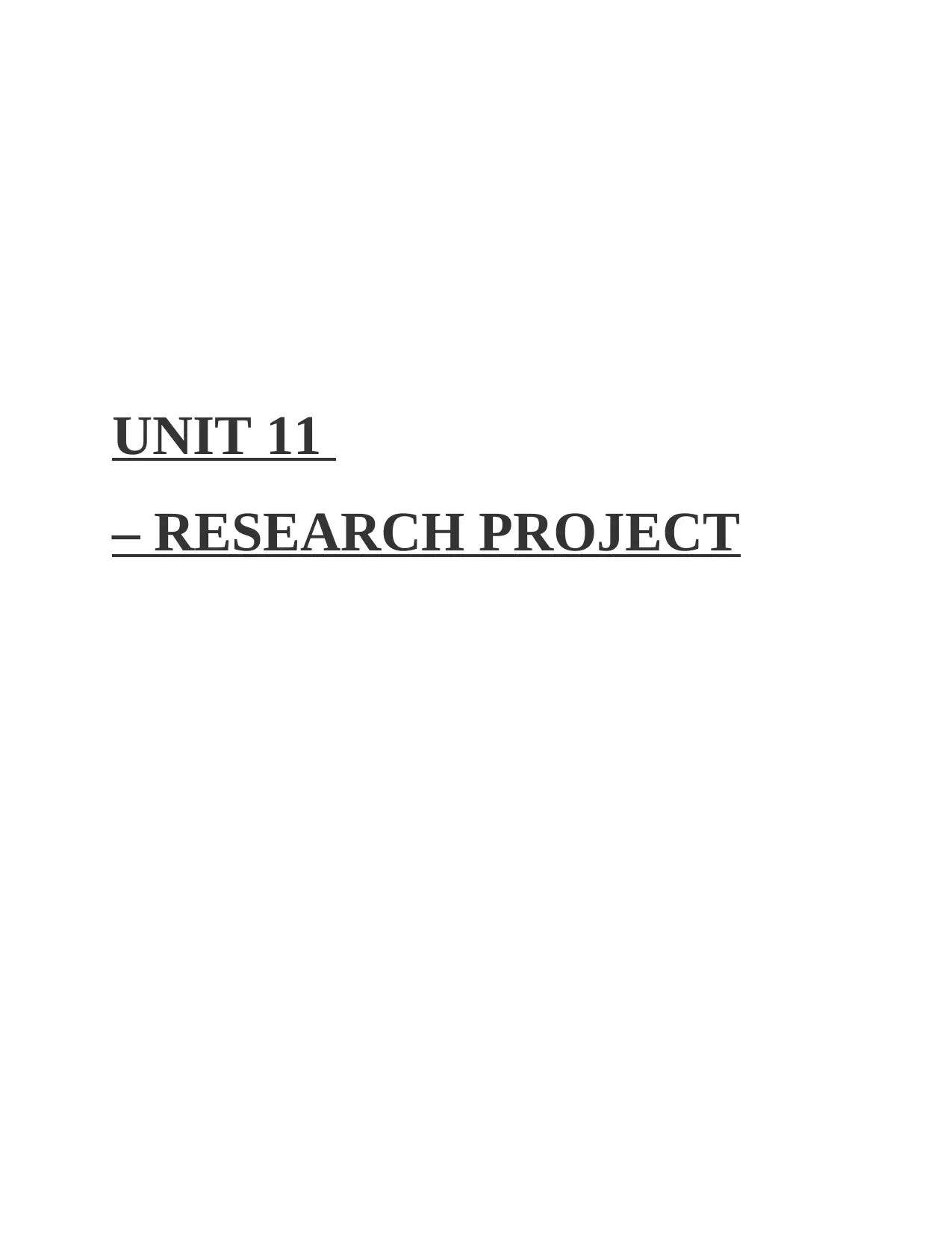
UNIT 11
– RESEARCH PROJECT
– RESEARCH PROJECT
Secure Best Marks with AI Grader
Need help grading? Try our AI Grader for instant feedback on your assignments.

Table of Contents
REFERENCES..............................................................................................................................21
REFERENCES..............................................................................................................................21
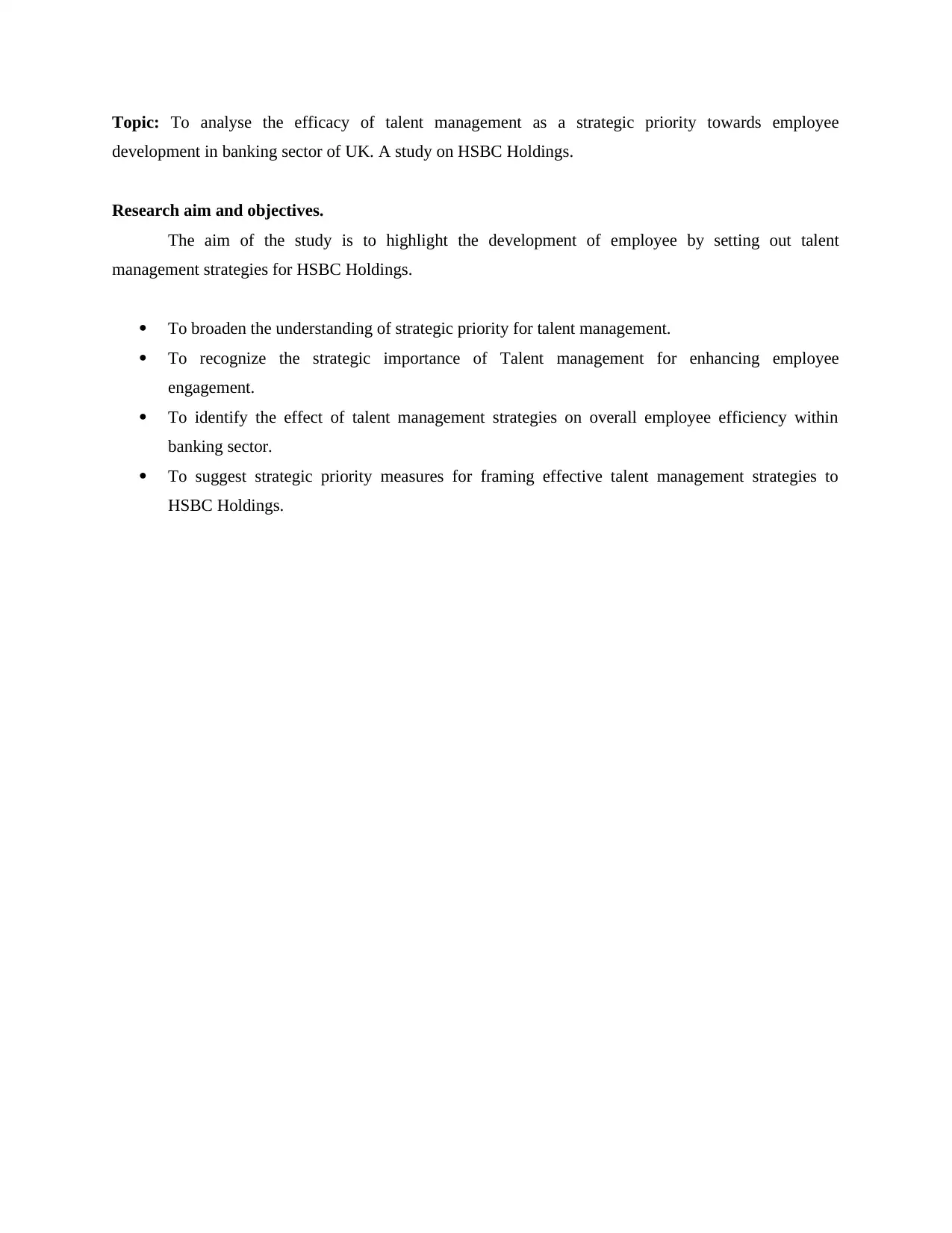
Topic: To analyse the efficacy of talent management as a strategic priority towards employee
development in banking sector of UK. A study on HSBC Holdings.
Research aim and objectives.
The aim of the study is to highlight the development of employee by setting out talent
management strategies for HSBC Holdings.
To broaden the understanding of strategic priority for talent management.
To recognize the strategic importance of Talent management for enhancing employee
engagement.
To identify the effect of talent management strategies on overall employee efficiency within
banking sector.
To suggest strategic priority measures for framing effective talent management strategies to
HSBC Holdings.
development in banking sector of UK. A study on HSBC Holdings.
Research aim and objectives.
The aim of the study is to highlight the development of employee by setting out talent
management strategies for HSBC Holdings.
To broaden the understanding of strategic priority for talent management.
To recognize the strategic importance of Talent management for enhancing employee
engagement.
To identify the effect of talent management strategies on overall employee efficiency within
banking sector.
To suggest strategic priority measures for framing effective talent management strategies to
HSBC Holdings.

Research Proposal Form:
Proposed Title: Talent Management – A key component of HRM
Proposed Title: Talent Management – A key component of HRM
Secure Best Marks with AI Grader
Need help grading? Try our AI Grader for instant feedback on your assignments.
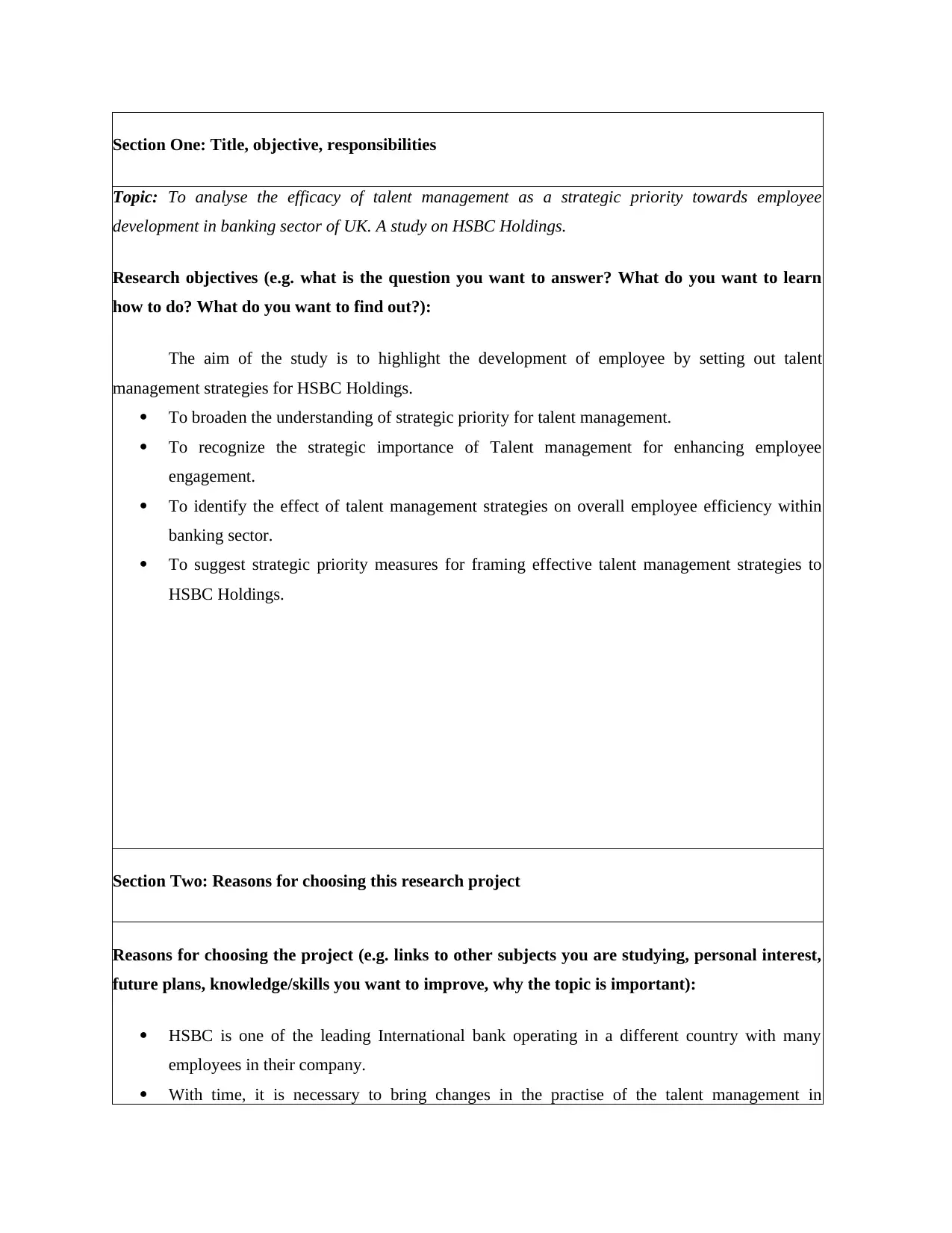
Section One: Title, objective, responsibilities
Topic: To analyse the efficacy of talent management as a strategic priority towards employee
development in banking sector of UK. A study on HSBC Holdings.
Research objectives (e.g. what is the question you want to answer? What do you want to learn
how to do? What do you want to find out?):
The aim of the study is to highlight the development of employee by setting out talent
management strategies for HSBC Holdings.
To broaden the understanding of strategic priority for talent management.
To recognize the strategic importance of Talent management for enhancing employee
engagement.
To identify the effect of talent management strategies on overall employee efficiency within
banking sector.
To suggest strategic priority measures for framing effective talent management strategies to
HSBC Holdings.
Section Two: Reasons for choosing this research project
Reasons for choosing the project (e.g. links to other subjects you are studying, personal interest,
future plans, knowledge/skills you want to improve, why the topic is important):
HSBC is one of the leading International bank operating in a different country with many
employees in their company.
With time, it is necessary to bring changes in the practise of the talent management in
Topic: To analyse the efficacy of talent management as a strategic priority towards employee
development in banking sector of UK. A study on HSBC Holdings.
Research objectives (e.g. what is the question you want to answer? What do you want to learn
how to do? What do you want to find out?):
The aim of the study is to highlight the development of employee by setting out talent
management strategies for HSBC Holdings.
To broaden the understanding of strategic priority for talent management.
To recognize the strategic importance of Talent management for enhancing employee
engagement.
To identify the effect of talent management strategies on overall employee efficiency within
banking sector.
To suggest strategic priority measures for framing effective talent management strategies to
HSBC Holdings.
Section Two: Reasons for choosing this research project
Reasons for choosing the project (e.g. links to other subjects you are studying, personal interest,
future plans, knowledge/skills you want to improve, why the topic is important):
HSBC is one of the leading International bank operating in a different country with many
employees in their company.
With time, it is necessary to bring changes in the practise of the talent management in
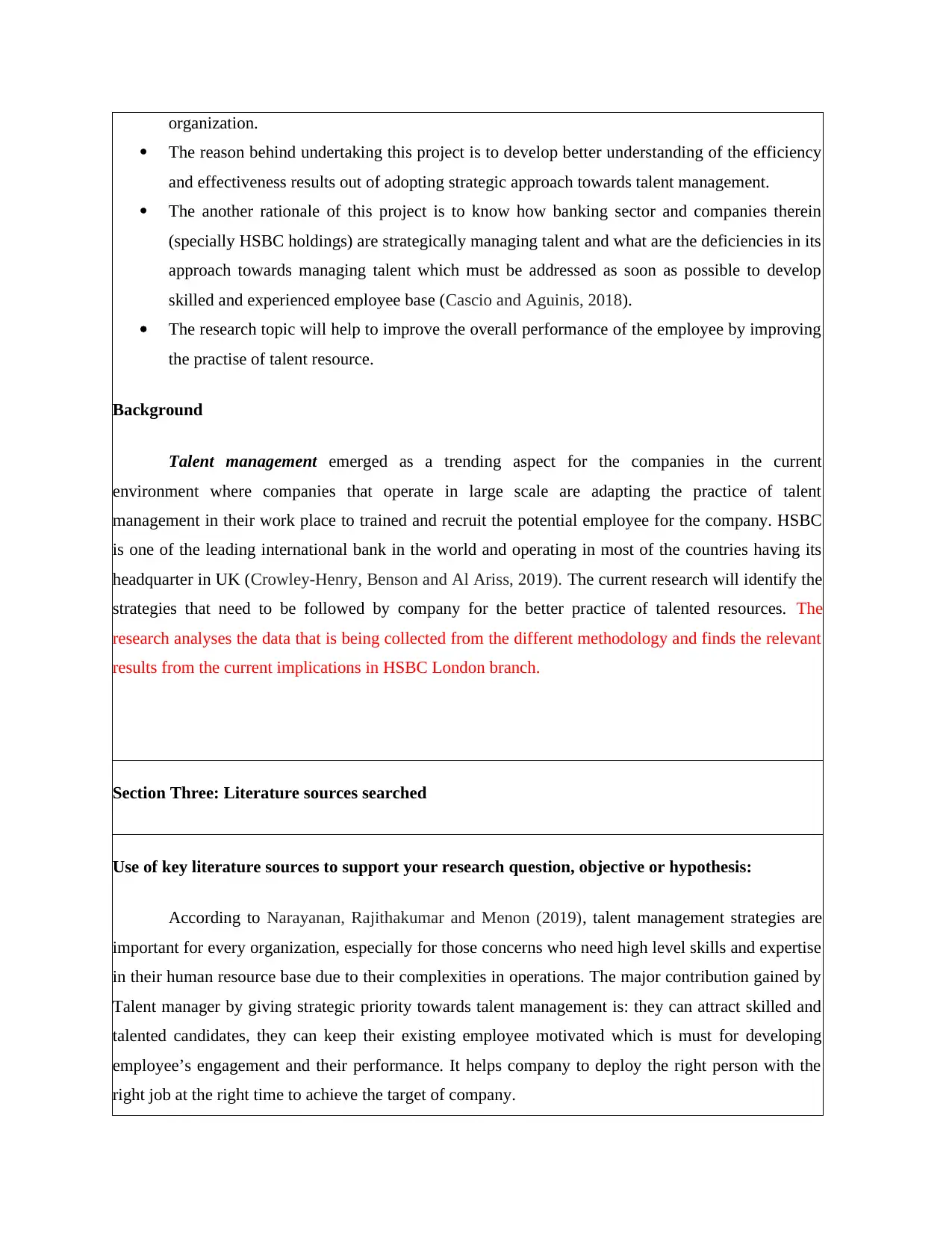
organization.
The reason behind undertaking this project is to develop better understanding of the efficiency
and effectiveness results out of adopting strategic approach towards talent management.
The another rationale of this project is to know how banking sector and companies therein
(specially HSBC holdings) are strategically managing talent and what are the deficiencies in its
approach towards managing talent which must be addressed as soon as possible to develop
skilled and experienced employee base (Cascio and Aguinis, 2018).
The research topic will help to improve the overall performance of the employee by improving
the practise of talent resource.
Background
Talent management emerged as a trending aspect for the companies in the current
environment where companies that operate in large scale are adapting the practice of talent
management in their work place to trained and recruit the potential employee for the company. HSBC
is one of the leading international bank in the world and operating in most of the countries having its
headquarter in UK (Crowley‐Henry, Benson and Al Ariss, 2019). The current research will identify the
strategies that need to be followed by company for the better practice of talented resources. The
research analyses the data that is being collected from the different methodology and finds the relevant
results from the current implications in HSBC London branch.
Section Three: Literature sources searched
Use of key literature sources to support your research question, objective or hypothesis:
According to Narayanan, Rajithakumar and Menon (2019), talent management strategies are
important for every organization, especially for those concerns who need high level skills and expertise
in their human resource base due to their complexities in operations. The major contribution gained by
Talent manager by giving strategic priority towards talent management is: they can attract skilled and
talented candidates, they can keep their existing employee motivated which is must for developing
employee’s engagement and their performance. It helps company to deploy the right person with the
right job at the right time to achieve the target of company.
The reason behind undertaking this project is to develop better understanding of the efficiency
and effectiveness results out of adopting strategic approach towards talent management.
The another rationale of this project is to know how banking sector and companies therein
(specially HSBC holdings) are strategically managing talent and what are the deficiencies in its
approach towards managing talent which must be addressed as soon as possible to develop
skilled and experienced employee base (Cascio and Aguinis, 2018).
The research topic will help to improve the overall performance of the employee by improving
the practise of talent resource.
Background
Talent management emerged as a trending aspect for the companies in the current
environment where companies that operate in large scale are adapting the practice of talent
management in their work place to trained and recruit the potential employee for the company. HSBC
is one of the leading international bank in the world and operating in most of the countries having its
headquarter in UK (Crowley‐Henry, Benson and Al Ariss, 2019). The current research will identify the
strategies that need to be followed by company for the better practice of talented resources. The
research analyses the data that is being collected from the different methodology and finds the relevant
results from the current implications in HSBC London branch.
Section Three: Literature sources searched
Use of key literature sources to support your research question, objective or hypothesis:
According to Narayanan, Rajithakumar and Menon (2019), talent management strategies are
important for every organization, especially for those concerns who need high level skills and expertise
in their human resource base due to their complexities in operations. The major contribution gained by
Talent manager by giving strategic priority towards talent management is: they can attract skilled and
talented candidates, they can keep their existing employee motivated which is must for developing
employee’s engagement and their performance. It helps company to deploy the right person with the
right job at the right time to achieve the target of company.
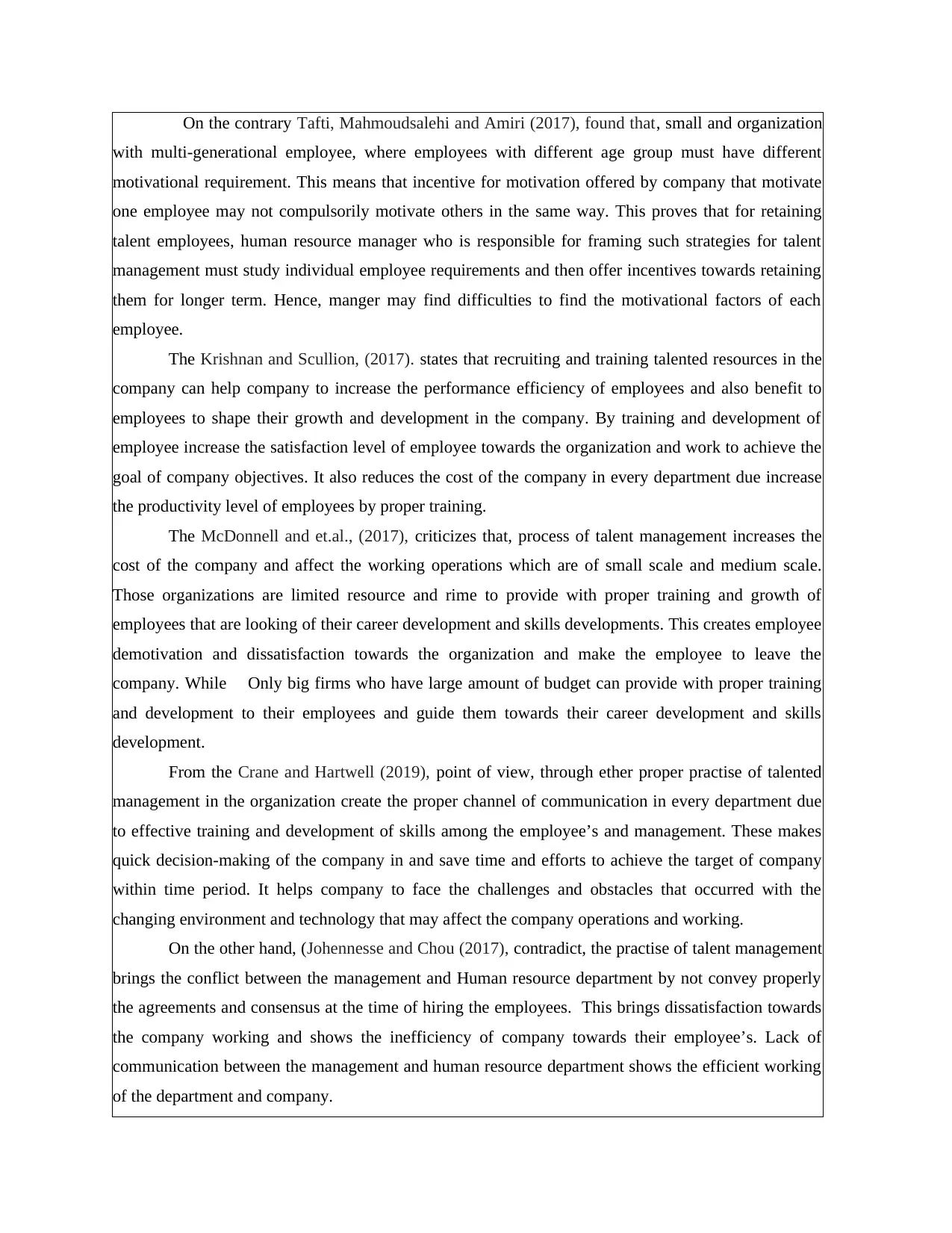
On the contrary Tafti, Mahmoudsalehi and Amiri (2017), found that, small and organization
with multi-generational employee, where employees with different age group must have different
motivational requirement. This means that incentive for motivation offered by company that motivate
one employee may not compulsorily motivate others in the same way. This proves that for retaining
talent employees, human resource manager who is responsible for framing such strategies for talent
management must study individual employee requirements and then offer incentives towards retaining
them for longer term. Hence, manger may find difficulties to find the motivational factors of each
employee.
The Krishnan and Scullion, (2017). states that recruiting and training talented resources in the
company can help company to increase the performance efficiency of employees and also benefit to
employees to shape their growth and development in the company. By training and development of
employee increase the satisfaction level of employee towards the organization and work to achieve the
goal of company objectives. It also reduces the cost of the company in every department due increase
the productivity level of employees by proper training.
The McDonnell and et.al., (2017), criticizes that, process of talent management increases the
cost of the company and affect the working operations which are of small scale and medium scale.
Those organizations are limited resource and rime to provide with proper training and growth of
employees that are looking of their career development and skills developments. This creates employee
demotivation and dissatisfaction towards the organization and make the employee to leave the
company. While Only big firms who have large amount of budget can provide with proper training
and development to their employees and guide them towards their career development and skills
development.
From the Crane and Hartwell (2019), point of view, through ether proper practise of talented
management in the organization create the proper channel of communication in every department due
to effective training and development of skills among the employee’s and management. These makes
quick decision-making of the company in and save time and efforts to achieve the target of company
within time period. It helps company to face the challenges and obstacles that occurred with the
changing environment and technology that may affect the company operations and working.
On the other hand, (Johennesse and Chou (2017), contradict, the practise of talent management
brings the conflict between the management and Human resource department by not convey properly
the agreements and consensus at the time of hiring the employees. This brings dissatisfaction towards
the company working and shows the inefficiency of company towards their employee’s. Lack of
communication between the management and human resource department shows the efficient working
of the department and company.
with multi-generational employee, where employees with different age group must have different
motivational requirement. This means that incentive for motivation offered by company that motivate
one employee may not compulsorily motivate others in the same way. This proves that for retaining
talent employees, human resource manager who is responsible for framing such strategies for talent
management must study individual employee requirements and then offer incentives towards retaining
them for longer term. Hence, manger may find difficulties to find the motivational factors of each
employee.
The Krishnan and Scullion, (2017). states that recruiting and training talented resources in the
company can help company to increase the performance efficiency of employees and also benefit to
employees to shape their growth and development in the company. By training and development of
employee increase the satisfaction level of employee towards the organization and work to achieve the
goal of company objectives. It also reduces the cost of the company in every department due increase
the productivity level of employees by proper training.
The McDonnell and et.al., (2017), criticizes that, process of talent management increases the
cost of the company and affect the working operations which are of small scale and medium scale.
Those organizations are limited resource and rime to provide with proper training and growth of
employees that are looking of their career development and skills developments. This creates employee
demotivation and dissatisfaction towards the organization and make the employee to leave the
company. While Only big firms who have large amount of budget can provide with proper training
and development to their employees and guide them towards their career development and skills
development.
From the Crane and Hartwell (2019), point of view, through ether proper practise of talented
management in the organization create the proper channel of communication in every department due
to effective training and development of skills among the employee’s and management. These makes
quick decision-making of the company in and save time and efforts to achieve the target of company
within time period. It helps company to face the challenges and obstacles that occurred with the
changing environment and technology that may affect the company operations and working.
On the other hand, (Johennesse and Chou (2017), contradict, the practise of talent management
brings the conflict between the management and Human resource department by not convey properly
the agreements and consensus at the time of hiring the employees. This brings dissatisfaction towards
the company working and shows the inefficiency of company towards their employee’s. Lack of
communication between the management and human resource department shows the efficient working
of the department and company.
Paraphrase This Document
Need a fresh take? Get an instant paraphrase of this document with our AI Paraphraser
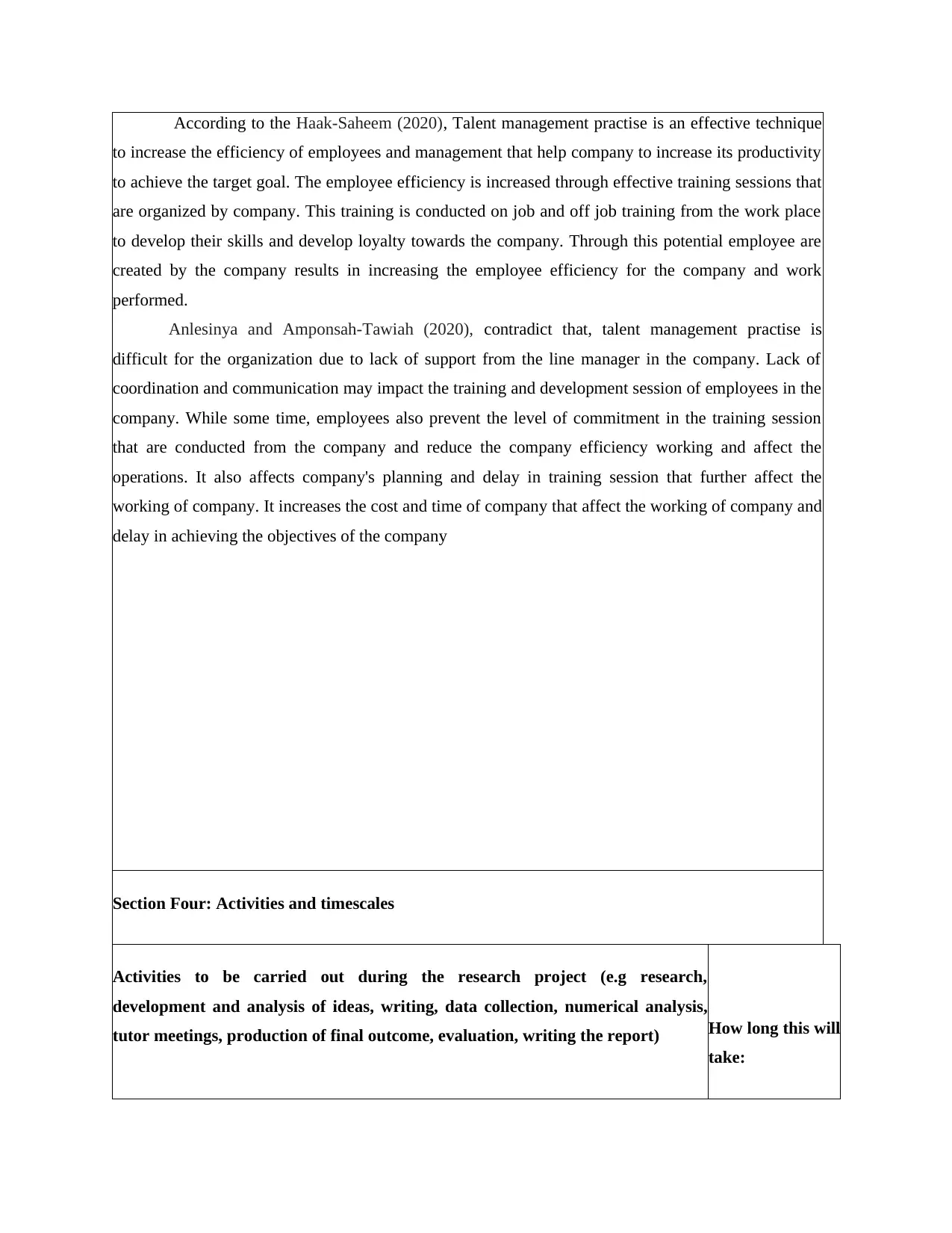
According to the Haak-Saheem (2020), Talent management practise is an effective technique
to increase the efficiency of employees and management that help company to increase its productivity
to achieve the target goal. The employee efficiency is increased through effective training sessions that
are organized by company. This training is conducted on job and off job training from the work place
to develop their skills and develop loyalty towards the company. Through this potential employee are
created by the company results in increasing the employee efficiency for the company and work
performed.
Anlesinya and Amponsah-Tawiah (2020), contradict that, talent management practise is
difficult for the organization due to lack of support from the line manager in the company. Lack of
coordination and communication may impact the training and development session of employees in the
company. While some time, employees also prevent the level of commitment in the training session
that are conducted from the company and reduce the company efficiency working and affect the
operations. It also affects company's planning and delay in training session that further affect the
working of company. It increases the cost and time of company that affect the working of company and
delay in achieving the objectives of the company
Section Four: Activities and timescales
Activities to be carried out during the research project (e.g research,
development and analysis of ideas, writing, data collection, numerical analysis,
tutor meetings, production of final outcome, evaluation, writing the report) How long this will
take:
to increase the efficiency of employees and management that help company to increase its productivity
to achieve the target goal. The employee efficiency is increased through effective training sessions that
are organized by company. This training is conducted on job and off job training from the work place
to develop their skills and develop loyalty towards the company. Through this potential employee are
created by the company results in increasing the employee efficiency for the company and work
performed.
Anlesinya and Amponsah-Tawiah (2020), contradict that, talent management practise is
difficult for the organization due to lack of support from the line manager in the company. Lack of
coordination and communication may impact the training and development session of employees in the
company. While some time, employees also prevent the level of commitment in the training session
that are conducted from the company and reduce the company efficiency working and affect the
operations. It also affects company's planning and delay in training session that further affect the
working of company. It increases the cost and time of company that affect the working of company and
delay in achieving the objectives of the company
Section Four: Activities and timescales
Activities to be carried out during the research project (e.g research,
development and analysis of ideas, writing, data collection, numerical analysis,
tutor meetings, production of final outcome, evaluation, writing the report) How long this will
take:
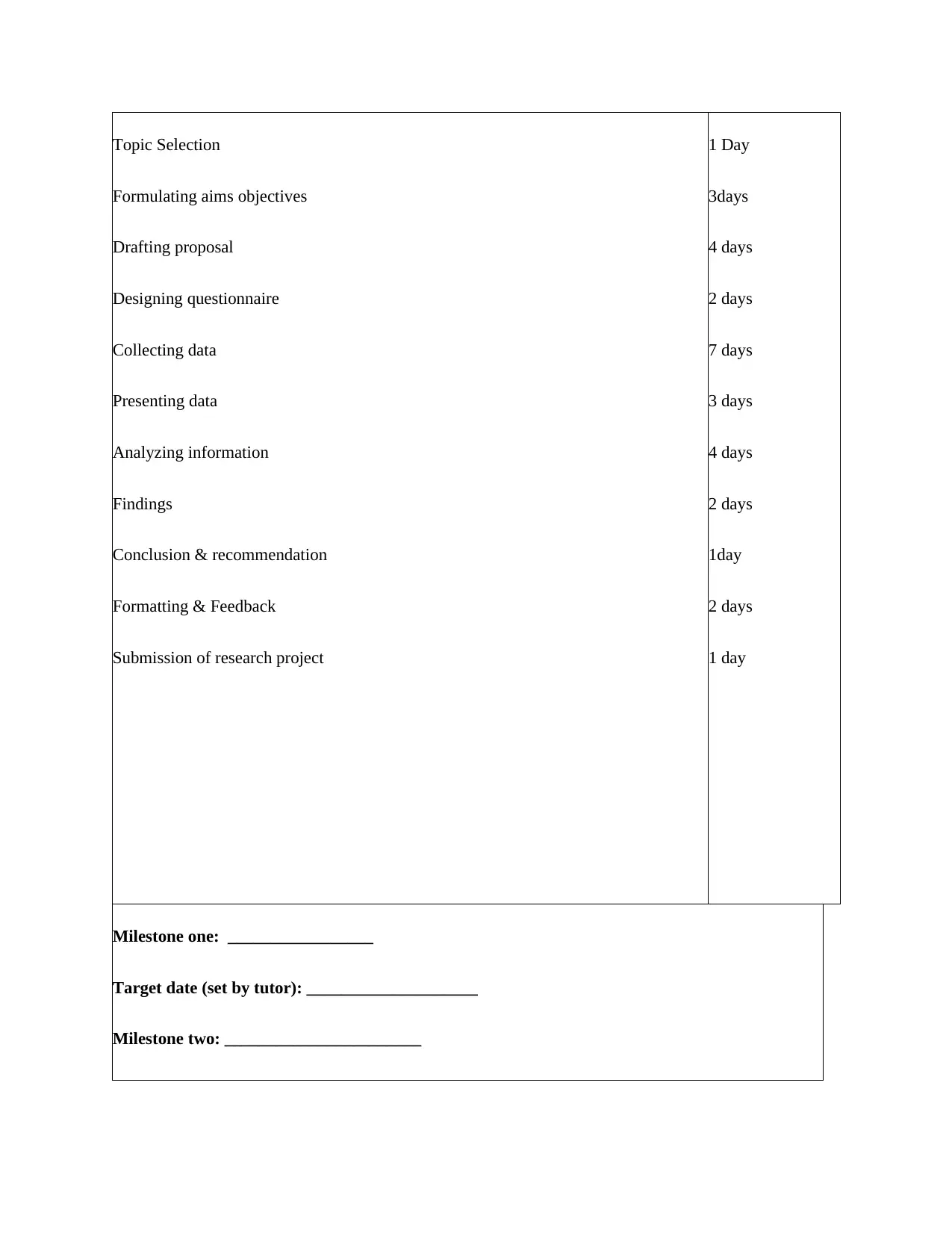
Topic Selection
Formulating aims objectives
Drafting proposal
Designing questionnaire
Collecting data
Presenting data
Analyzing information
Findings
Conclusion & recommendation
Formatting & Feedback
Submission of research project
1 Day
3days
4 days
2 days
7 days
3 days
4 days
2 days
1day
2 days
1 day
Milestone one: _________________
Target date (set by tutor): ____________________
Milestone two: _______________________
Formulating aims objectives
Drafting proposal
Designing questionnaire
Collecting data
Presenting data
Analyzing information
Findings
Conclusion & recommendation
Formatting & Feedback
Submission of research project
1 Day
3days
4 days
2 days
7 days
3 days
4 days
2 days
1day
2 days
1 day
Milestone one: _________________
Target date (set by tutor): ____________________
Milestone two: _______________________
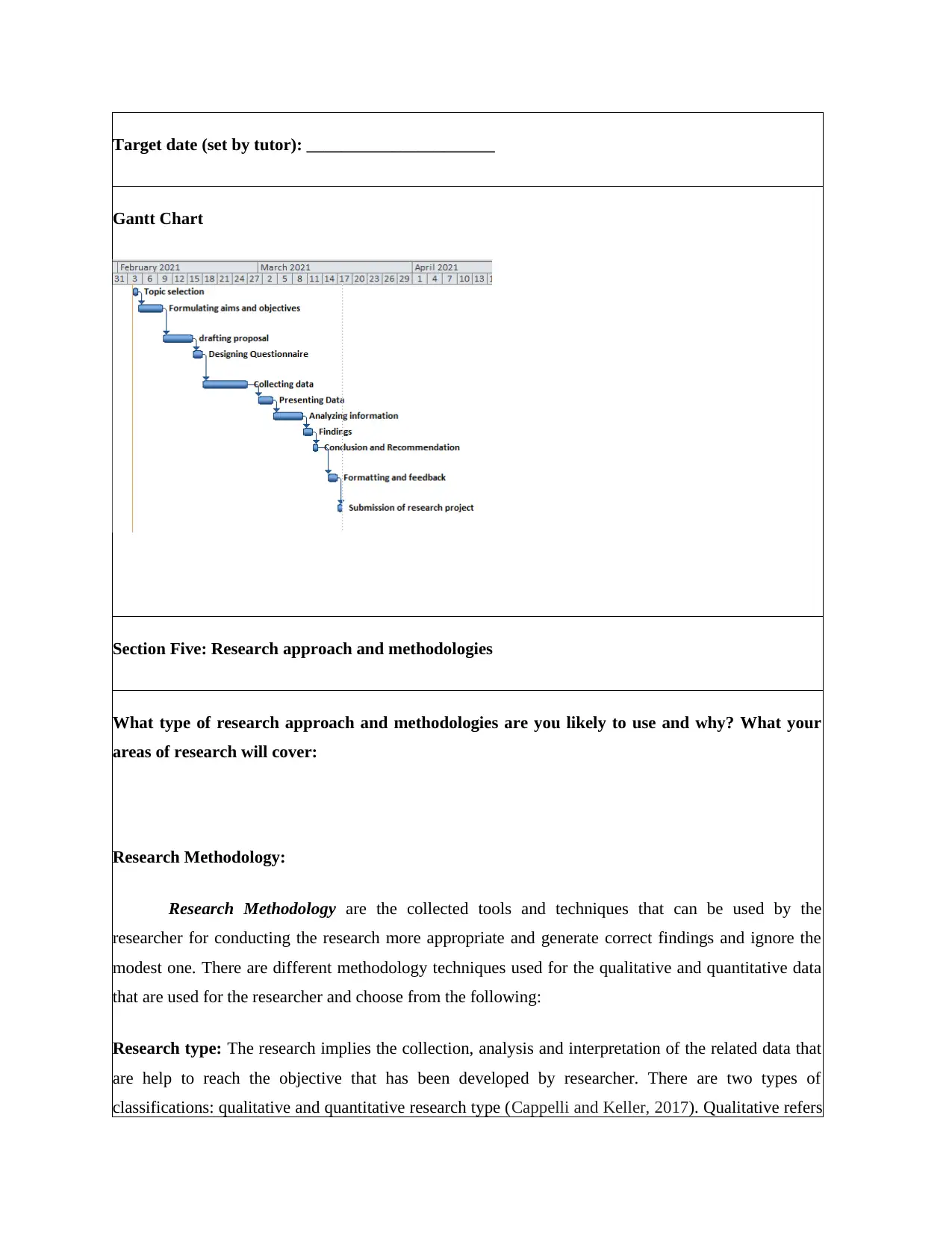
Target date (set by tutor): ______________________
Gantt Chart
Section Five: Research approach and methodologies
What type of research approach and methodologies are you likely to use and why? What your
areas of research will cover:
Research Methodology:
Research Methodology are the collected tools and techniques that can be used by the
researcher for conducting the research more appropriate and generate correct findings and ignore the
modest one. There are different methodology techniques used for the qualitative and quantitative data
that are used for the researcher and choose from the following:
Research type: The research implies the collection, analysis and interpretation of the related data that
are help to reach the objective that has been developed by researcher. There are two types of
classifications: qualitative and quantitative research type (Cappelli and Keller, 2017). Qualitative refers
Gantt Chart
Section Five: Research approach and methodologies
What type of research approach and methodologies are you likely to use and why? What your
areas of research will cover:
Research Methodology:
Research Methodology are the collected tools and techniques that can be used by the
researcher for conducting the research more appropriate and generate correct findings and ignore the
modest one. There are different methodology techniques used for the qualitative and quantitative data
that are used for the researcher and choose from the following:
Research type: The research implies the collection, analysis and interpretation of the related data that
are help to reach the objective that has been developed by researcher. There are two types of
classifications: qualitative and quantitative research type (Cappelli and Keller, 2017). Qualitative refers
Secure Best Marks with AI Grader
Need help grading? Try our AI Grader for instant feedback on your assignments.
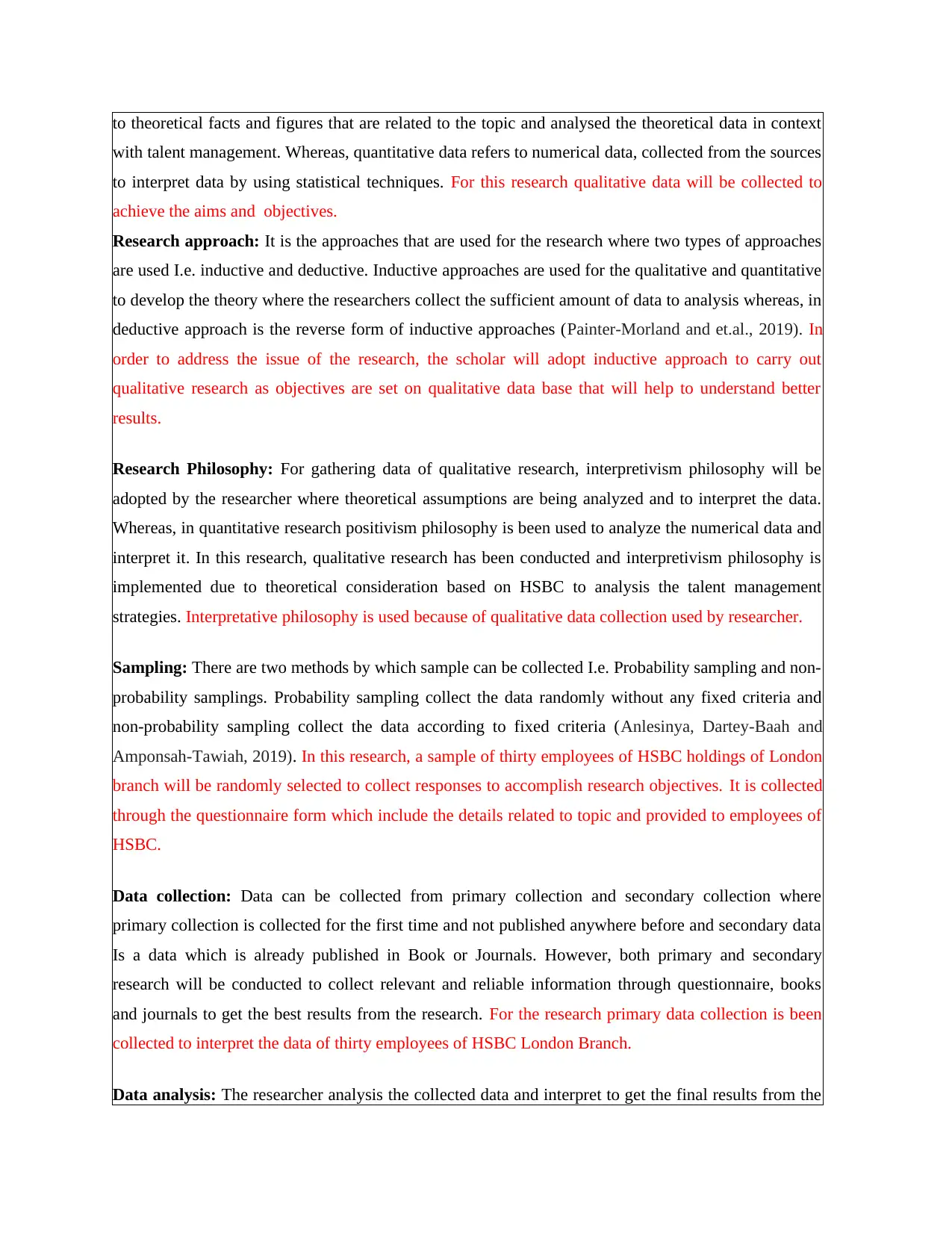
to theoretical facts and figures that are related to the topic and analysed the theoretical data in context
with talent management. Whereas, quantitative data refers to numerical data, collected from the sources
to interpret data by using statistical techniques. For this research qualitative data will be collected to
achieve the aims and objectives.
Research approach: It is the approaches that are used for the research where two types of approaches
are used I.e. inductive and deductive. Inductive approaches are used for the qualitative and quantitative
to develop the theory where the researchers collect the sufficient amount of data to analysis whereas, in
deductive approach is the reverse form of inductive approaches (Painter‐Morland and et.al., 2019). In
order to address the issue of the research, the scholar will adopt inductive approach to carry out
qualitative research as objectives are set on qualitative data base that will help to understand better
results.
Research Philosophy: For gathering data of qualitative research, interpretivism philosophy will be
adopted by the researcher where theoretical assumptions are being analyzed and to interpret the data.
Whereas, in quantitative research positivism philosophy is been used to analyze the numerical data and
interpret it. In this research, qualitative research has been conducted and interpretivism philosophy is
implemented due to theoretical consideration based on HSBC to analysis the talent management
strategies. Interpretative philosophy is used because of qualitative data collection used by researcher.
Sampling: There are two methods by which sample can be collected I.e. Probability sampling and non-
probability samplings. Probability sampling collect the data randomly without any fixed criteria and
non-probability sampling collect the data according to fixed criteria (Anlesinya, Dartey-Baah and
Amponsah-Tawiah, 2019). In this research, a sample of thirty employees of HSBC holdings of London
branch will be randomly selected to collect responses to accomplish research objectives. It is collected
through the questionnaire form which include the details related to topic and provided to employees of
HSBC.
Data collection: Data can be collected from primary collection and secondary collection where
primary collection is collected for the first time and not published anywhere before and secondary data
Is a data which is already published in Book or Journals. However, both primary and secondary
research will be conducted to collect relevant and reliable information through questionnaire, books
and journals to get the best results from the research. For the research primary data collection is been
collected to interpret the data of thirty employees of HSBC London Branch.
Data analysis: The researcher analysis the collected data and interpret to get the final results from the
with talent management. Whereas, quantitative data refers to numerical data, collected from the sources
to interpret data by using statistical techniques. For this research qualitative data will be collected to
achieve the aims and objectives.
Research approach: It is the approaches that are used for the research where two types of approaches
are used I.e. inductive and deductive. Inductive approaches are used for the qualitative and quantitative
to develop the theory where the researchers collect the sufficient amount of data to analysis whereas, in
deductive approach is the reverse form of inductive approaches (Painter‐Morland and et.al., 2019). In
order to address the issue of the research, the scholar will adopt inductive approach to carry out
qualitative research as objectives are set on qualitative data base that will help to understand better
results.
Research Philosophy: For gathering data of qualitative research, interpretivism philosophy will be
adopted by the researcher where theoretical assumptions are being analyzed and to interpret the data.
Whereas, in quantitative research positivism philosophy is been used to analyze the numerical data and
interpret it. In this research, qualitative research has been conducted and interpretivism philosophy is
implemented due to theoretical consideration based on HSBC to analysis the talent management
strategies. Interpretative philosophy is used because of qualitative data collection used by researcher.
Sampling: There are two methods by which sample can be collected I.e. Probability sampling and non-
probability samplings. Probability sampling collect the data randomly without any fixed criteria and
non-probability sampling collect the data according to fixed criteria (Anlesinya, Dartey-Baah and
Amponsah-Tawiah, 2019). In this research, a sample of thirty employees of HSBC holdings of London
branch will be randomly selected to collect responses to accomplish research objectives. It is collected
through the questionnaire form which include the details related to topic and provided to employees of
HSBC.
Data collection: Data can be collected from primary collection and secondary collection where
primary collection is collected for the first time and not published anywhere before and secondary data
Is a data which is already published in Book or Journals. However, both primary and secondary
research will be conducted to collect relevant and reliable information through questionnaire, books
and journals to get the best results from the research. For the research primary data collection is been
collected to interpret the data of thirty employees of HSBC London Branch.
Data analysis: The researcher analysis the collected data and interpret to get the final results from the
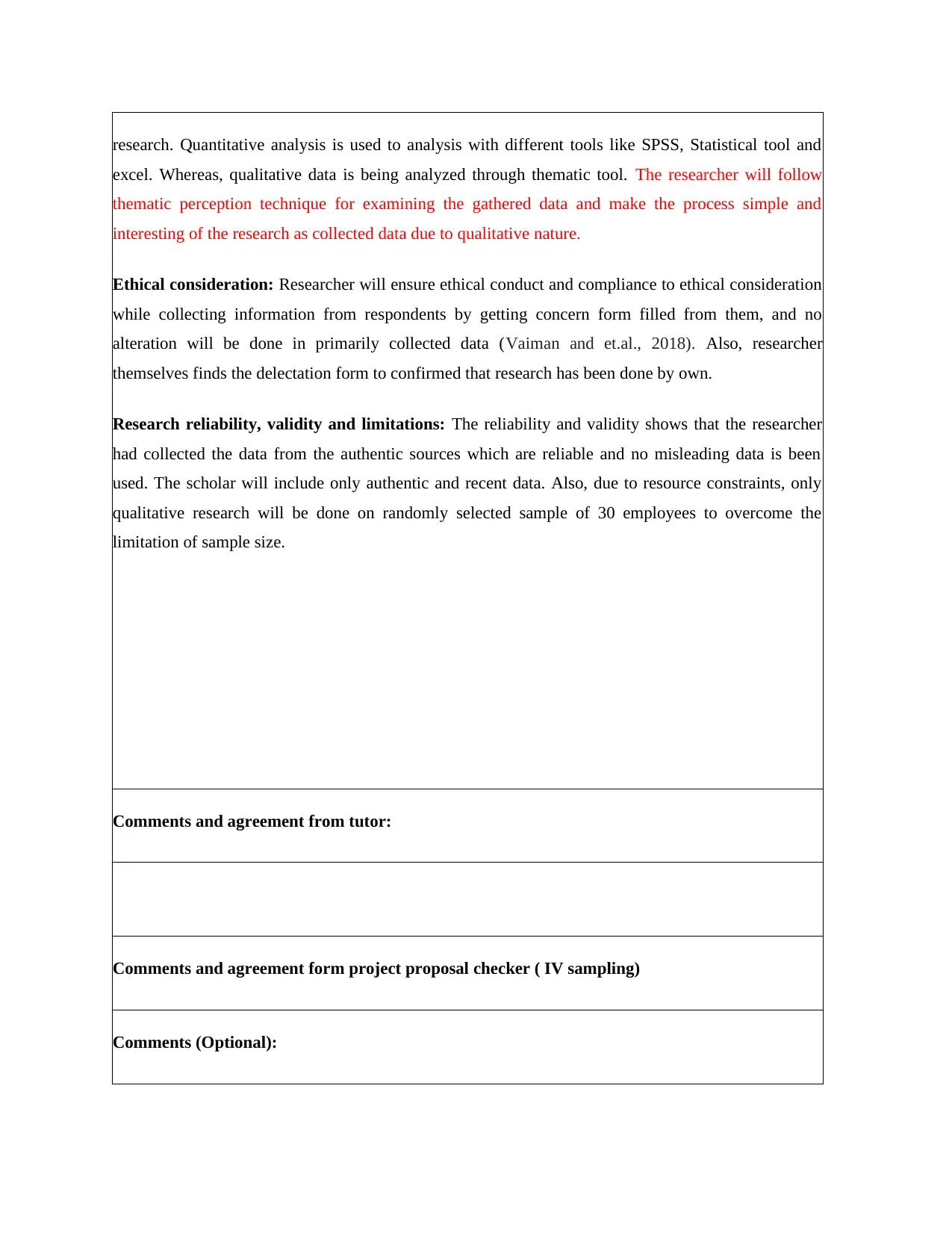
research. Quantitative analysis is used to analysis with different tools like SPSS, Statistical tool and
excel. Whereas, qualitative data is being analyzed through thematic tool. The researcher will follow
thematic perception technique for examining the gathered data and make the process simple and
interesting of the research as collected data due to qualitative nature.
Ethical consideration: Researcher will ensure ethical conduct and compliance to ethical consideration
while collecting information from respondents by getting concern form filled from them, and no
alteration will be done in primarily collected data (Vaiman and et.al., 2018). Also, researcher
themselves finds the delectation form to confirmed that research has been done by own.
Research reliability, validity and limitations: The reliability and validity shows that the researcher
had collected the data from the authentic sources which are reliable and no misleading data is been
used. The scholar will include only authentic and recent data. Also, due to resource constraints, only
qualitative research will be done on randomly selected sample of 30 employees to overcome the
limitation of sample size.
Comments and agreement from tutor:
Comments and agreement form project proposal checker ( IV sampling)
Comments (Optional):
excel. Whereas, qualitative data is being analyzed through thematic tool. The researcher will follow
thematic perception technique for examining the gathered data and make the process simple and
interesting of the research as collected data due to qualitative nature.
Ethical consideration: Researcher will ensure ethical conduct and compliance to ethical consideration
while collecting information from respondents by getting concern form filled from them, and no
alteration will be done in primarily collected data (Vaiman and et.al., 2018). Also, researcher
themselves finds the delectation form to confirmed that research has been done by own.
Research reliability, validity and limitations: The reliability and validity shows that the researcher
had collected the data from the authentic sources which are reliable and no misleading data is been
used. The scholar will include only authentic and recent data. Also, due to resource constraints, only
qualitative research will be done on randomly selected sample of 30 employees to overcome the
limitation of sample size.
Comments and agreement from tutor:
Comments and agreement form project proposal checker ( IV sampling)
Comments (Optional):
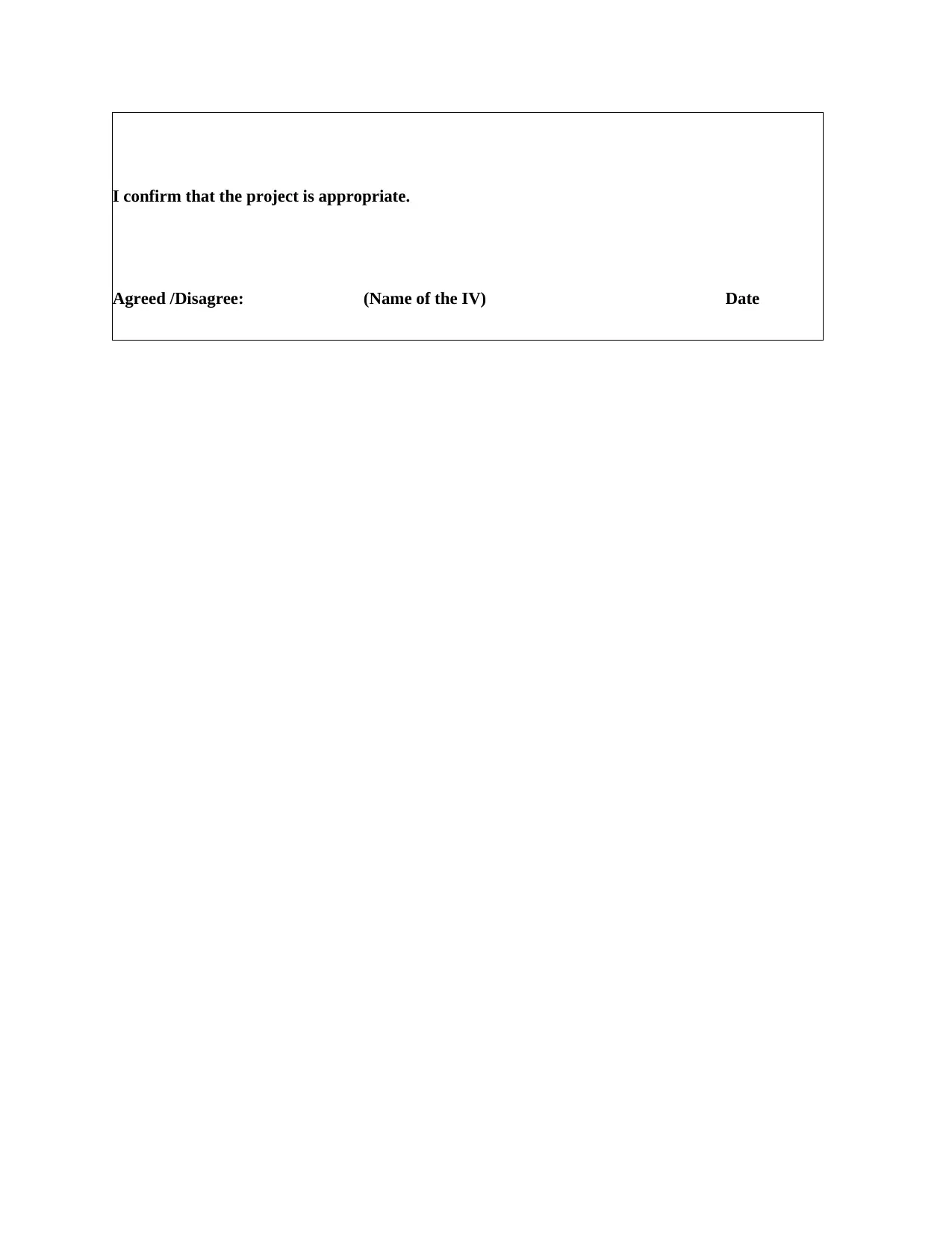
I confirm that the project is appropriate.
Agreed /Disagree: (Name of the IV) Date
Agreed /Disagree: (Name of the IV) Date
Paraphrase This Document
Need a fresh take? Get an instant paraphrase of this document with our AI Paraphraser
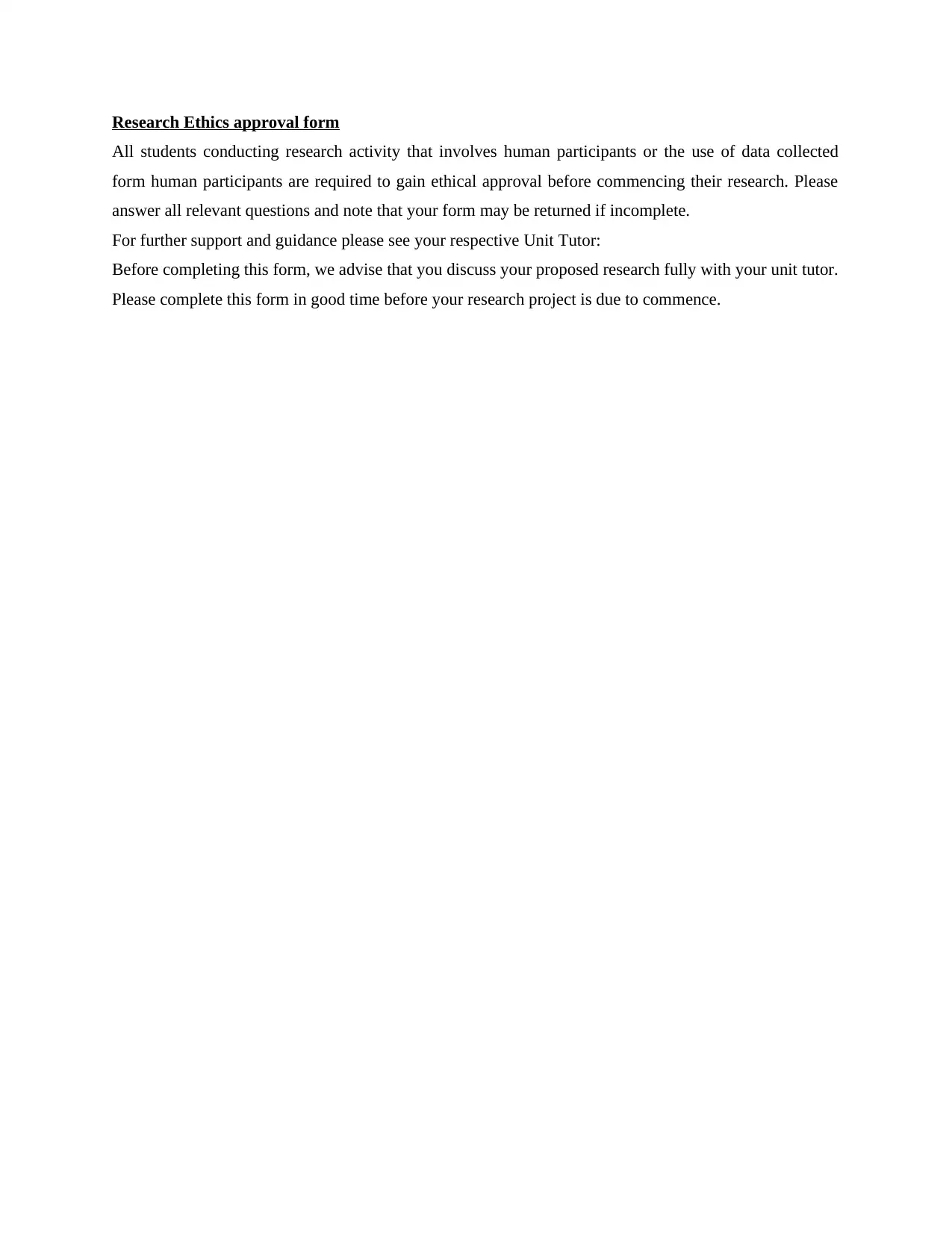
Research Ethics approval form
All students conducting research activity that involves human participants or the use of data collected
form human participants are required to gain ethical approval before commencing their research. Please
answer all relevant questions and note that your form may be returned if incomplete.
For further support and guidance please see your respective Unit Tutor:
Before completing this form, we advise that you discuss your proposed research fully with your unit tutor.
Please complete this form in good time before your research project is due to commence.
All students conducting research activity that involves human participants or the use of data collected
form human participants are required to gain ethical approval before commencing their research. Please
answer all relevant questions and note that your form may be returned if incomplete.
For further support and guidance please see your respective Unit Tutor:
Before completing this form, we advise that you discuss your proposed research fully with your unit tutor.
Please complete this form in good time before your research project is due to commence.
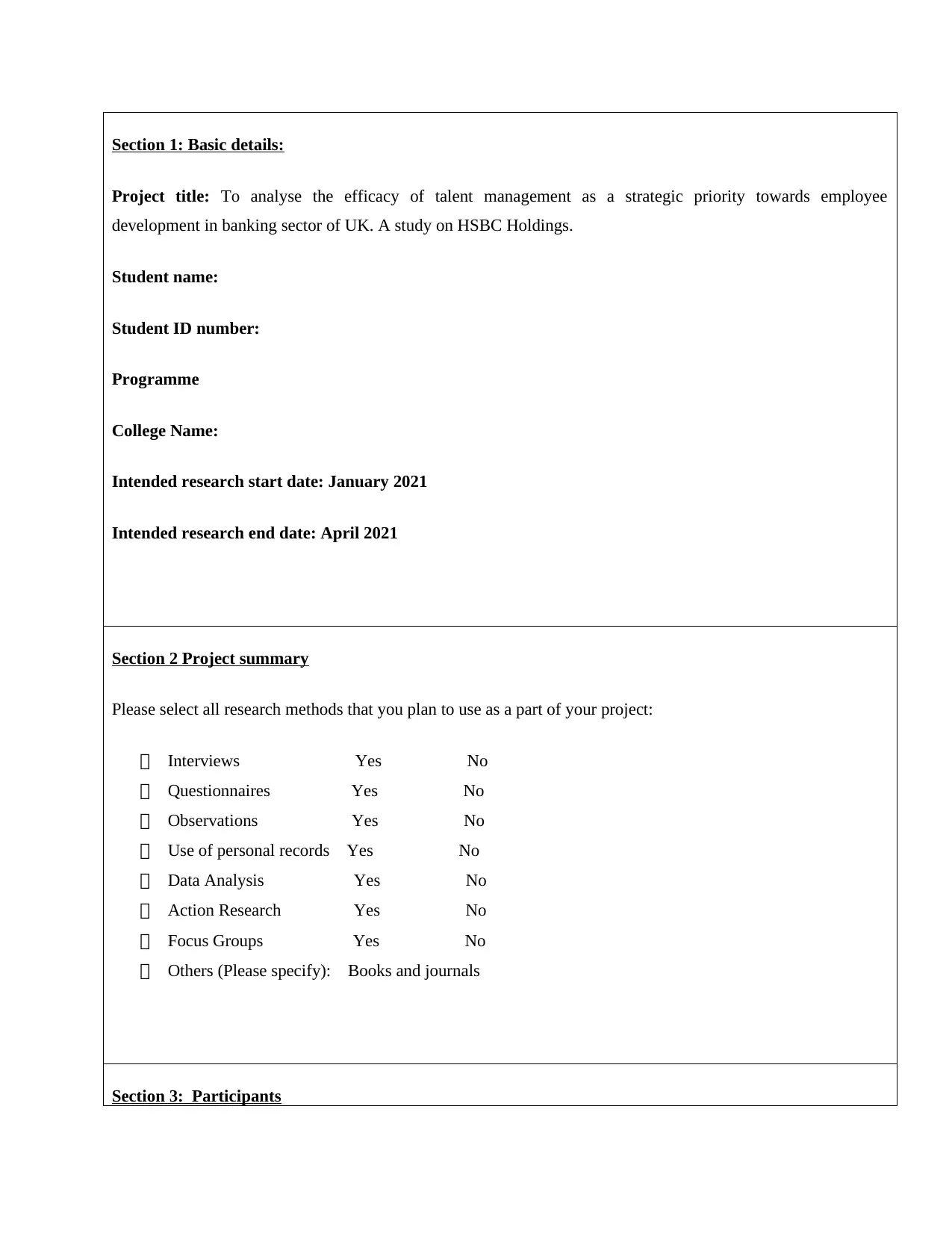
Section 1: Basic details:
Project title: To analyse the efficacy of talent management as a strategic priority towards employee
development in banking sector of UK. A study on HSBC Holdings.
Student name:
Student ID number:
Programme
College Name:
Intended research start date: January 2021
Intended research end date: April 2021
Section 2 Project summary
Please select all research methods that you plan to use as a part of your project:
Interviews Yes No
Questionnaires Yes No
Observations Yes No
Use of personal records Yes No
Data Analysis Yes No
Action Research Yes No
Focus Groups Yes No
Others (Please specify): Books and journals
Section 3: Participants
Project title: To analyse the efficacy of talent management as a strategic priority towards employee
development in banking sector of UK. A study on HSBC Holdings.
Student name:
Student ID number:
Programme
College Name:
Intended research start date: January 2021
Intended research end date: April 2021
Section 2 Project summary
Please select all research methods that you plan to use as a part of your project:
Interviews Yes No
Questionnaires Yes No
Observations Yes No
Use of personal records Yes No
Data Analysis Yes No
Action Research Yes No
Focus Groups Yes No
Others (Please specify): Books and journals
Section 3: Participants
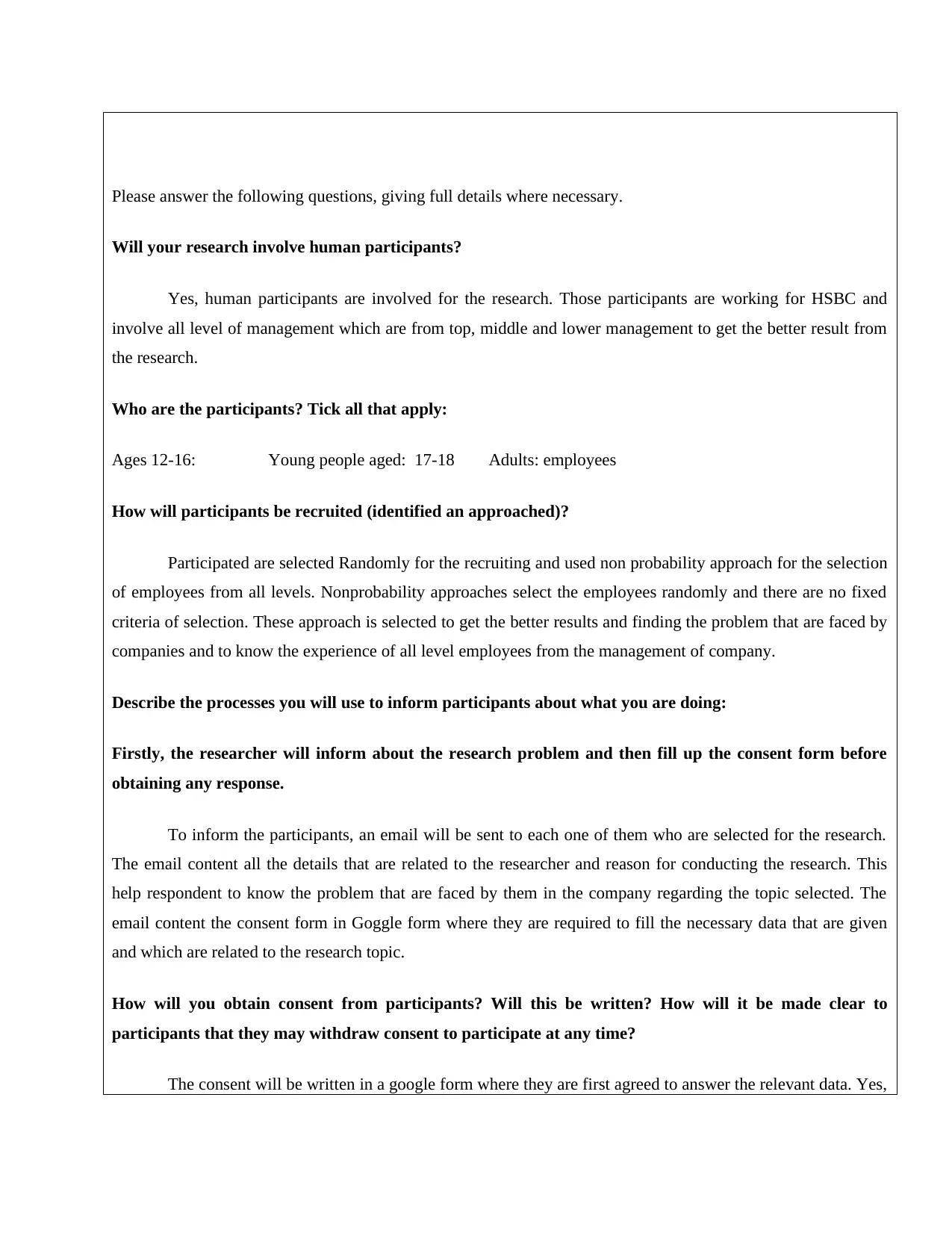
Please answer the following questions, giving full details where necessary.
Will your research involve human participants?
Yes, human participants are involved for the research. Those participants are working for HSBC and
involve all level of management which are from top, middle and lower management to get the better result from
the research.
Who are the participants? Tick all that apply:
Ages 12-16: Young people aged: 17-18 Adults: employees
How will participants be recruited (identified an approached)?
Participated are selected Randomly for the recruiting and used non probability approach for the selection
of employees from all levels. Nonprobability approaches select the employees randomly and there are no fixed
criteria of selection. These approach is selected to get the better results and finding the problem that are faced by
companies and to know the experience of all level employees from the management of company.
Describe the processes you will use to inform participants about what you are doing:
Firstly, the researcher will inform about the research problem and then fill up the consent form before
obtaining any response.
To inform the participants, an email will be sent to each one of them who are selected for the research.
The email content all the details that are related to the researcher and reason for conducting the research. This
help respondent to know the problem that are faced by them in the company regarding the topic selected. The
email content the consent form in Goggle form where they are required to fill the necessary data that are given
and which are related to the research topic.
How will you obtain consent from participants? Will this be written? How will it be made clear to
participants that they may withdraw consent to participate at any time?
The consent will be written in a google form where they are first agreed to answer the relevant data. Yes,
Will your research involve human participants?
Yes, human participants are involved for the research. Those participants are working for HSBC and
involve all level of management which are from top, middle and lower management to get the better result from
the research.
Who are the participants? Tick all that apply:
Ages 12-16: Young people aged: 17-18 Adults: employees
How will participants be recruited (identified an approached)?
Participated are selected Randomly for the recruiting and used non probability approach for the selection
of employees from all levels. Nonprobability approaches select the employees randomly and there are no fixed
criteria of selection. These approach is selected to get the better results and finding the problem that are faced by
companies and to know the experience of all level employees from the management of company.
Describe the processes you will use to inform participants about what you are doing:
Firstly, the researcher will inform about the research problem and then fill up the consent form before
obtaining any response.
To inform the participants, an email will be sent to each one of them who are selected for the research.
The email content all the details that are related to the researcher and reason for conducting the research. This
help respondent to know the problem that are faced by them in the company regarding the topic selected. The
email content the consent form in Goggle form where they are required to fill the necessary data that are given
and which are related to the research topic.
How will you obtain consent from participants? Will this be written? How will it be made clear to
participants that they may withdraw consent to participate at any time?
The consent will be written in a google form where they are first agreed to answer the relevant data. Yes,
Secure Best Marks with AI Grader
Need help grading? Try our AI Grader for instant feedback on your assignments.
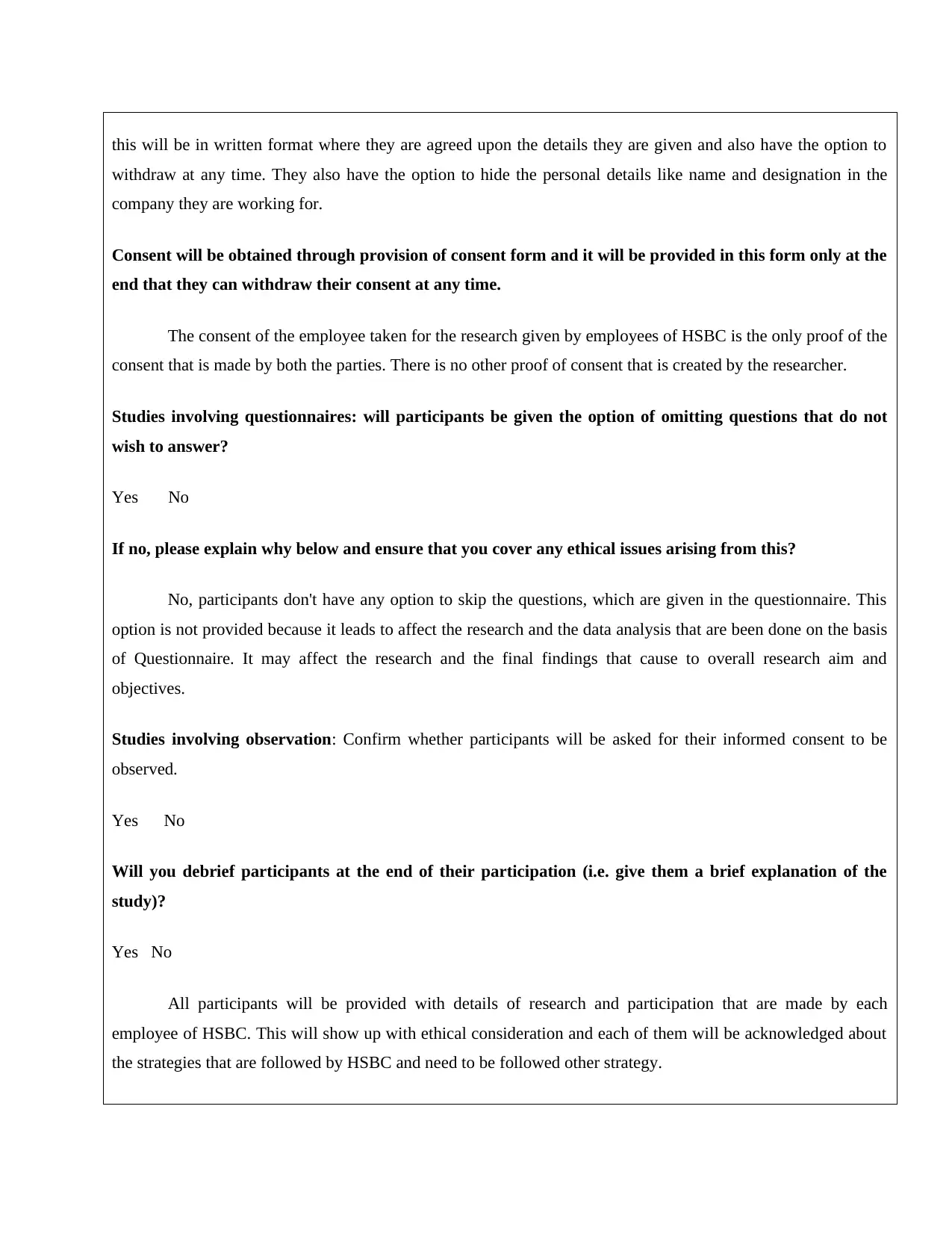
this will be in written format where they are agreed upon the details they are given and also have the option to
withdraw at any time. They also have the option to hide the personal details like name and designation in the
company they are working for.
Consent will be obtained through provision of consent form and it will be provided in this form only at the
end that they can withdraw their consent at any time.
The consent of the employee taken for the research given by employees of HSBC is the only proof of the
consent that is made by both the parties. There is no other proof of consent that is created by the researcher.
Studies involving questionnaires: will participants be given the option of omitting questions that do not
wish to answer?
Yes No
If no, please explain why below and ensure that you cover any ethical issues arising from this?
No, participants don't have any option to skip the questions, which are given in the questionnaire. This
option is not provided because it leads to affect the research and the data analysis that are been done on the basis
of Questionnaire. It may affect the research and the final findings that cause to overall research aim and
objectives.
Studies involving observation: Confirm whether participants will be asked for their informed consent to be
observed.
Yes No
Will you debrief participants at the end of their participation (i.e. give them a brief explanation of the
study)?
Yes No
All participants will be provided with details of research and participation that are made by each
employee of HSBC. This will show up with ethical consideration and each of them will be acknowledged about
the strategies that are followed by HSBC and need to be followed other strategy.
withdraw at any time. They also have the option to hide the personal details like name and designation in the
company they are working for.
Consent will be obtained through provision of consent form and it will be provided in this form only at the
end that they can withdraw their consent at any time.
The consent of the employee taken for the research given by employees of HSBC is the only proof of the
consent that is made by both the parties. There is no other proof of consent that is created by the researcher.
Studies involving questionnaires: will participants be given the option of omitting questions that do not
wish to answer?
Yes No
If no, please explain why below and ensure that you cover any ethical issues arising from this?
No, participants don't have any option to skip the questions, which are given in the questionnaire. This
option is not provided because it leads to affect the research and the data analysis that are been done on the basis
of Questionnaire. It may affect the research and the final findings that cause to overall research aim and
objectives.
Studies involving observation: Confirm whether participants will be asked for their informed consent to be
observed.
Yes No
Will you debrief participants at the end of their participation (i.e. give them a brief explanation of the
study)?
Yes No
All participants will be provided with details of research and participation that are made by each
employee of HSBC. This will show up with ethical consideration and each of them will be acknowledged about
the strategies that are followed by HSBC and need to be followed other strategy.
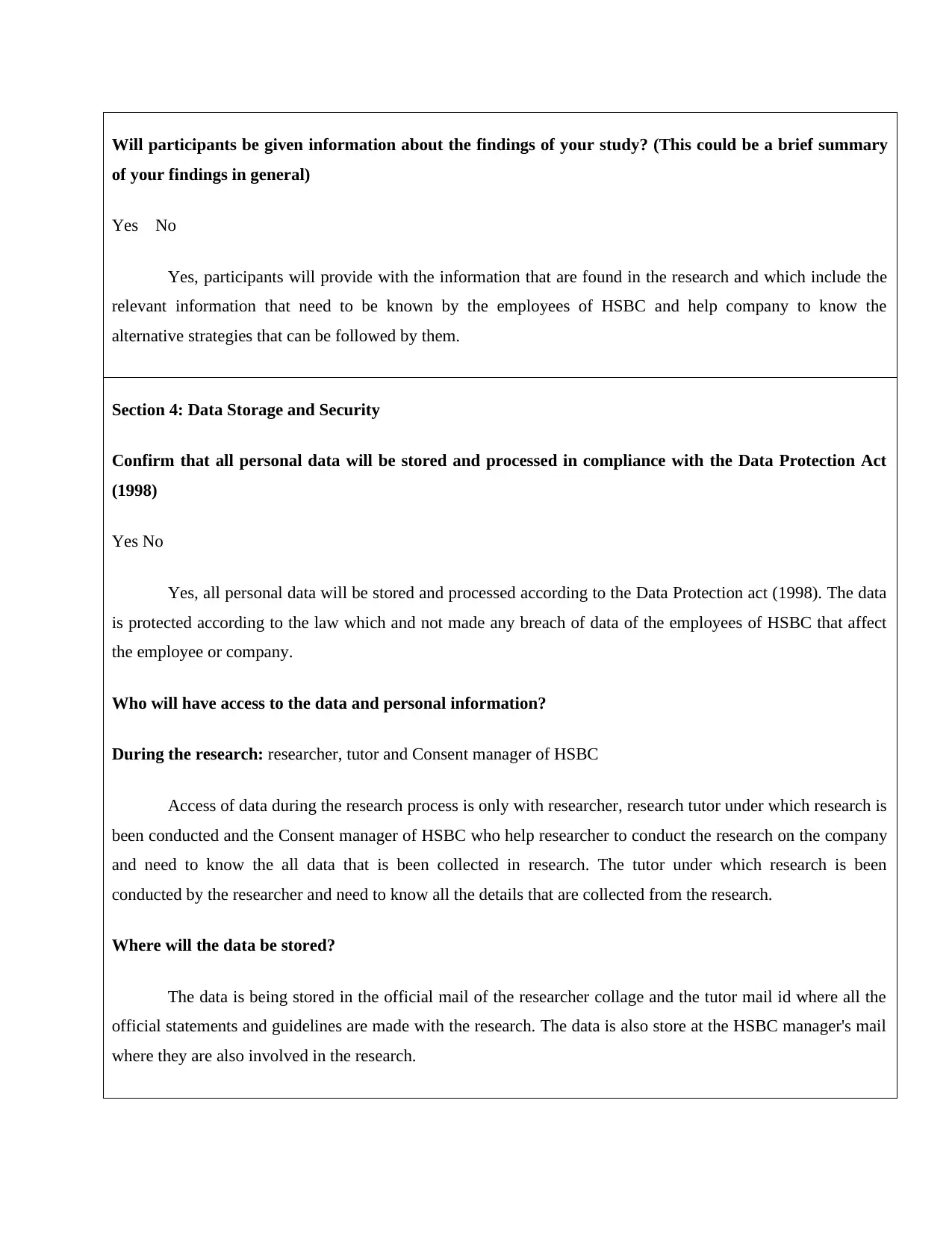
Will participants be given information about the findings of your study? (This could be a brief summary
of your findings in general)
Yes No
Yes, participants will provide with the information that are found in the research and which include the
relevant information that need to be known by the employees of HSBC and help company to know the
alternative strategies that can be followed by them.
Section 4: Data Storage and Security
Confirm that all personal data will be stored and processed in compliance with the Data Protection Act
(1998)
Yes No
Yes, all personal data will be stored and processed according to the Data Protection act (1998). The data
is protected according to the law which and not made any breach of data of the employees of HSBC that affect
the employee or company.
Who will have access to the data and personal information?
During the research: researcher, tutor and Consent manager of HSBC
Access of data during the research process is only with researcher, research tutor under which research is
been conducted and the Consent manager of HSBC who help researcher to conduct the research on the company
and need to know the all data that is been collected in research. The tutor under which research is been
conducted by the researcher and need to know all the details that are collected from the research.
Where will the data be stored?
The data is being stored in the official mail of the researcher collage and the tutor mail id where all the
official statements and guidelines are made with the research. The data is also store at the HSBC manager's mail
where they are also involved in the research.
of your findings in general)
Yes No
Yes, participants will provide with the information that are found in the research and which include the
relevant information that need to be known by the employees of HSBC and help company to know the
alternative strategies that can be followed by them.
Section 4: Data Storage and Security
Confirm that all personal data will be stored and processed in compliance with the Data Protection Act
(1998)
Yes No
Yes, all personal data will be stored and processed according to the Data Protection act (1998). The data
is protected according to the law which and not made any breach of data of the employees of HSBC that affect
the employee or company.
Who will have access to the data and personal information?
During the research: researcher, tutor and Consent manager of HSBC
Access of data during the research process is only with researcher, research tutor under which research is
been conducted and the Consent manager of HSBC who help researcher to conduct the research on the company
and need to know the all data that is been collected in research. The tutor under which research is been
conducted by the researcher and need to know all the details that are collected from the research.
Where will the data be stored?
The data is being stored in the official mail of the researcher collage and the tutor mail id where all the
official statements and guidelines are made with the research. The data is also store at the HSBC manager's mail
where they are also involved in the research.
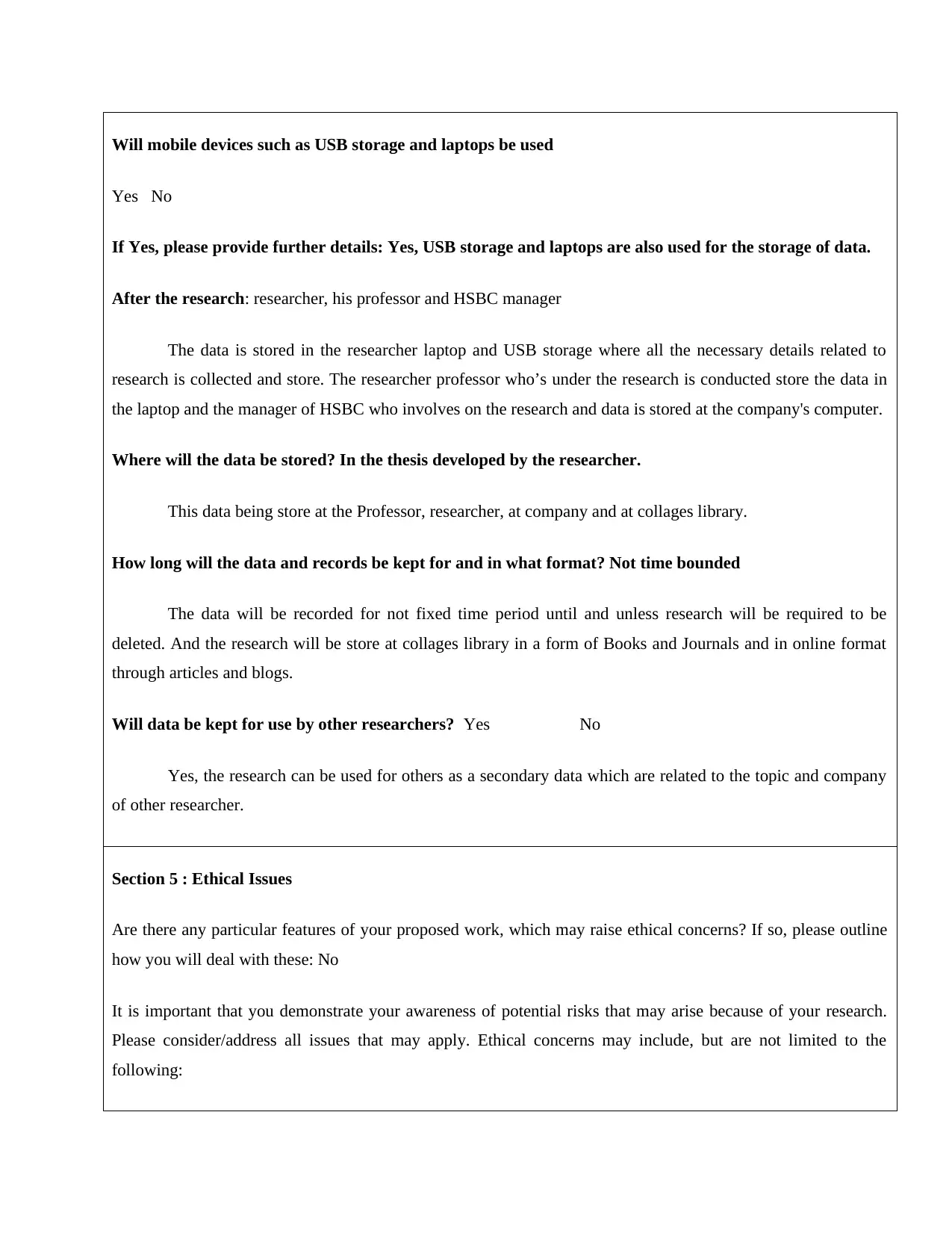
Will mobile devices such as USB storage and laptops be used
Yes No
If Yes, please provide further details: Yes, USB storage and laptops are also used for the storage of data.
After the research: researcher, his professor and HSBC manager
The data is stored in the researcher laptop and USB storage where all the necessary details related to
research is collected and store. The researcher professor who’s under the research is conducted store the data in
the laptop and the manager of HSBC who involves on the research and data is stored at the company's computer.
Where will the data be stored? In the thesis developed by the researcher.
This data being store at the Professor, researcher, at company and at collages library.
How long will the data and records be kept for and in what format? Not time bounded
The data will be recorded for not fixed time period until and unless research will be required to be
deleted. And the research will be store at collages library in a form of Books and Journals and in online format
through articles and blogs.
Will data be kept for use by other researchers? Yes No
Yes, the research can be used for others as a secondary data which are related to the topic and company
of other researcher.
Section 5 : Ethical Issues
Are there any particular features of your proposed work, which may raise ethical concerns? If so, please outline
how you will deal with these: No
It is important that you demonstrate your awareness of potential risks that may arise because of your research.
Please consider/address all issues that may apply. Ethical concerns may include, but are not limited to the
following:
Yes No
If Yes, please provide further details: Yes, USB storage and laptops are also used for the storage of data.
After the research: researcher, his professor and HSBC manager
The data is stored in the researcher laptop and USB storage where all the necessary details related to
research is collected and store. The researcher professor who’s under the research is conducted store the data in
the laptop and the manager of HSBC who involves on the research and data is stored at the company's computer.
Where will the data be stored? In the thesis developed by the researcher.
This data being store at the Professor, researcher, at company and at collages library.
How long will the data and records be kept for and in what format? Not time bounded
The data will be recorded for not fixed time period until and unless research will be required to be
deleted. And the research will be store at collages library in a form of Books and Journals and in online format
through articles and blogs.
Will data be kept for use by other researchers? Yes No
Yes, the research can be used for others as a secondary data which are related to the topic and company
of other researcher.
Section 5 : Ethical Issues
Are there any particular features of your proposed work, which may raise ethical concerns? If so, please outline
how you will deal with these: No
It is important that you demonstrate your awareness of potential risks that may arise because of your research.
Please consider/address all issues that may apply. Ethical concerns may include, but are not limited to the
following:
Paraphrase This Document
Need a fresh take? Get an instant paraphrase of this document with our AI Paraphraser
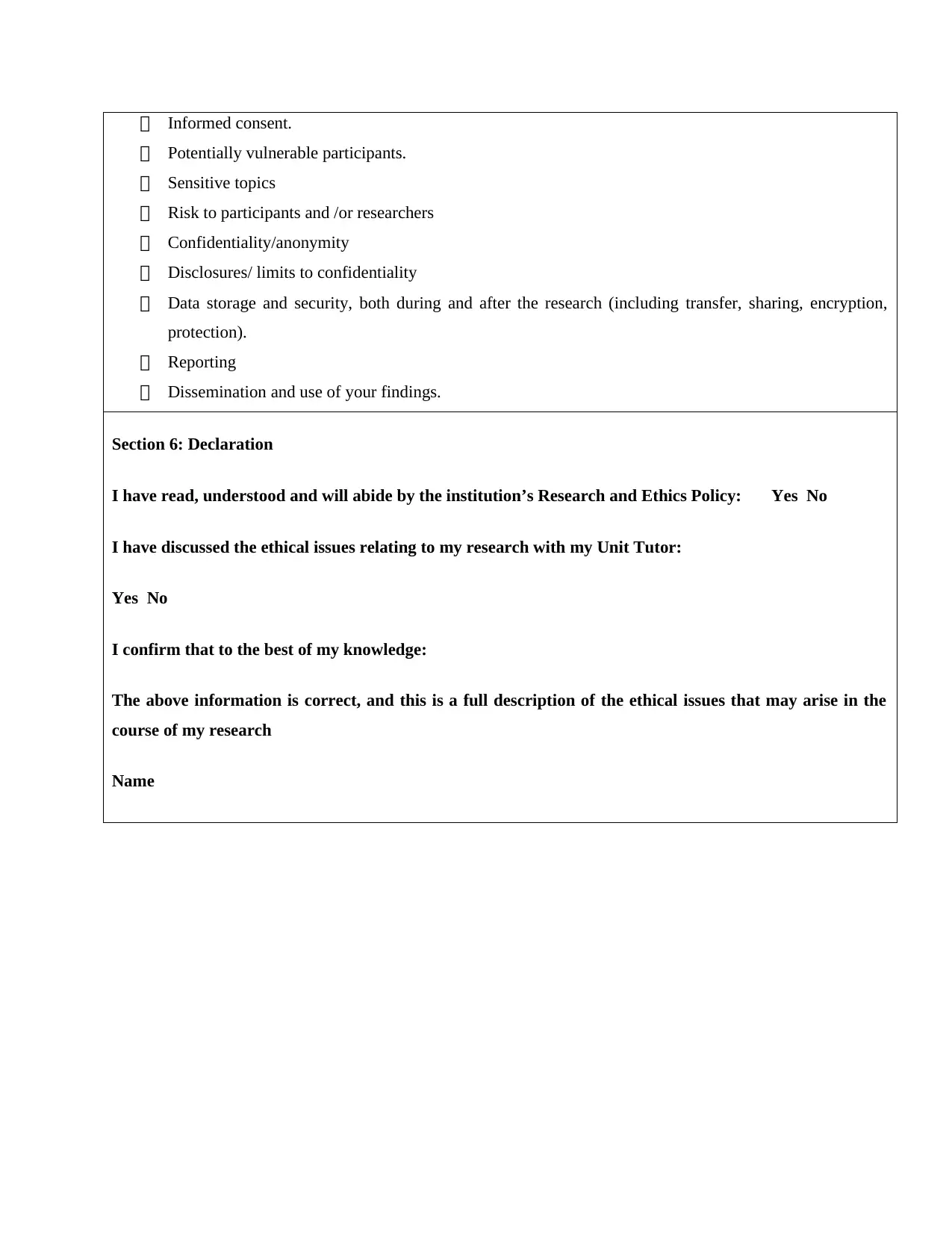
Informed consent.
Potentially vulnerable participants.
Sensitive topics
Risk to participants and /or researchers
Confidentiality/anonymity
Disclosures/ limits to confidentiality
Data storage and security, both during and after the research (including transfer, sharing, encryption,
protection).
Reporting
Dissemination and use of your findings.
Section 6: Declaration
I have read, understood and will abide by the institution’s Research and Ethics Policy: Yes No
I have discussed the ethical issues relating to my research with my Unit Tutor:
Yes No
I confirm that to the best of my knowledge:
The above information is correct, and this is a full description of the ethical issues that may arise in the
course of my research
Name
Potentially vulnerable participants.
Sensitive topics
Risk to participants and /or researchers
Confidentiality/anonymity
Disclosures/ limits to confidentiality
Data storage and security, both during and after the research (including transfer, sharing, encryption,
protection).
Reporting
Dissemination and use of your findings.
Section 6: Declaration
I have read, understood and will abide by the institution’s Research and Ethics Policy: Yes No
I have discussed the ethical issues relating to my research with my Unit Tutor:
Yes No
I confirm that to the best of my knowledge:
The above information is correct, and this is a full description of the ethical issues that may arise in the
course of my research
Name
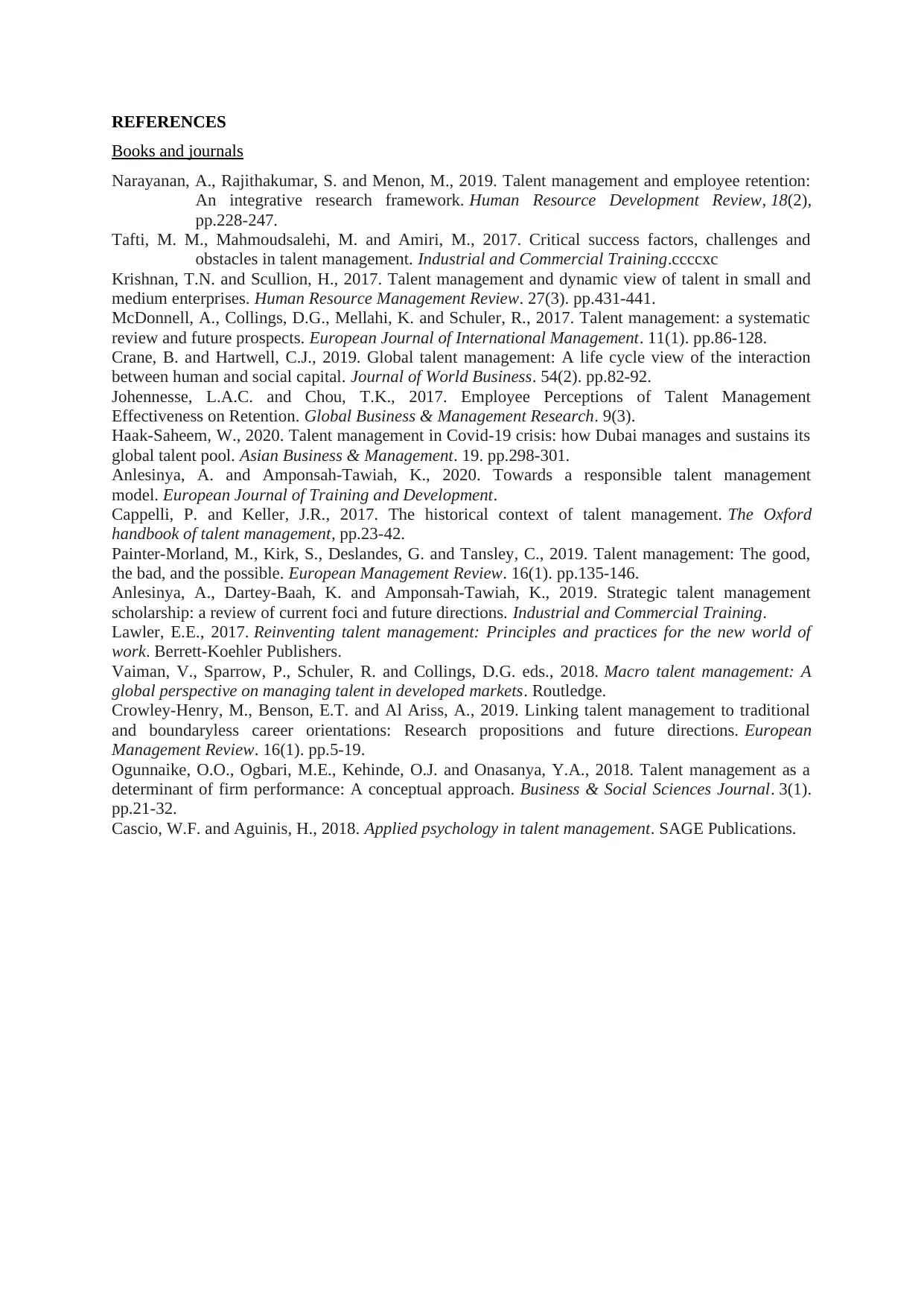
REFERENCES
Books and journals
Narayanan, A., Rajithakumar, S. and Menon, M., 2019. Talent management and employee retention:
An integrative research framework. Human Resource Development Review, 18(2),
pp.228-247.
Tafti, M. M., Mahmoudsalehi, M. and Amiri, M., 2017. Critical success factors, challenges and
obstacles in talent management. Industrial and Commercial Training.ccccxc
Krishnan, T.N. and Scullion, H., 2017. Talent management and dynamic view of talent in small and
medium enterprises. Human Resource Management Review. 27(3). pp.431-441.
McDonnell, A., Collings, D.G., Mellahi, K. and Schuler, R., 2017. Talent management: a systematic
review and future prospects. European Journal of International Management. 11(1). pp.86-128.
Crane, B. and Hartwell, C.J., 2019. Global talent management: A life cycle view of the interaction
between human and social capital. Journal of World Business. 54(2). pp.82-92.
Johennesse, L.A.C. and Chou, T.K., 2017. Employee Perceptions of Talent Management
Effectiveness on Retention. Global Business & Management Research. 9(3).
Haak-Saheem, W., 2020. Talent management in Covid-19 crisis: how Dubai manages and sustains its
global talent pool. Asian Business & Management. 19. pp.298-301.
Anlesinya, A. and Amponsah-Tawiah, K., 2020. Towards a responsible talent management
model. European Journal of Training and Development.
Cappelli, P. and Keller, J.R., 2017. The historical context of talent management. The Oxford
handbook of talent management, pp.23-42.
Painter‐Morland, M., Kirk, S., Deslandes, G. and Tansley, C., 2019. Talent management: The good,
the bad, and the possible. European Management Review. 16(1). pp.135-146.
Anlesinya, A., Dartey-Baah, K. and Amponsah-Tawiah, K., 2019. Strategic talent management
scholarship: a review of current foci and future directions. Industrial and Commercial Training.
Lawler, E.E., 2017. Reinventing talent management: Principles and practices for the new world of
work. Berrett-Koehler Publishers.
Vaiman, V., Sparrow, P., Schuler, R. and Collings, D.G. eds., 2018. Macro talent management: A
global perspective on managing talent in developed markets. Routledge.
Crowley‐Henry, M., Benson, E.T. and Al Ariss, A., 2019. Linking talent management to traditional
and boundaryless career orientations: Research propositions and future directions. European
Management Review. 16(1). pp.5-19.
Ogunnaike, O.O., Ogbari, M.E., Kehinde, O.J. and Onasanya, Y.A., 2018. Talent management as a
determinant of firm performance: A conceptual approach. Business & Social Sciences Journal. 3(1).
pp.21-32.
Cascio, W.F. and Aguinis, H., 2018. Applied psychology in talent management. SAGE Publications.
Books and journals
Narayanan, A., Rajithakumar, S. and Menon, M., 2019. Talent management and employee retention:
An integrative research framework. Human Resource Development Review, 18(2),
pp.228-247.
Tafti, M. M., Mahmoudsalehi, M. and Amiri, M., 2017. Critical success factors, challenges and
obstacles in talent management. Industrial and Commercial Training.ccccxc
Krishnan, T.N. and Scullion, H., 2017. Talent management and dynamic view of talent in small and
medium enterprises. Human Resource Management Review. 27(3). pp.431-441.
McDonnell, A., Collings, D.G., Mellahi, K. and Schuler, R., 2017. Talent management: a systematic
review and future prospects. European Journal of International Management. 11(1). pp.86-128.
Crane, B. and Hartwell, C.J., 2019. Global talent management: A life cycle view of the interaction
between human and social capital. Journal of World Business. 54(2). pp.82-92.
Johennesse, L.A.C. and Chou, T.K., 2017. Employee Perceptions of Talent Management
Effectiveness on Retention. Global Business & Management Research. 9(3).
Haak-Saheem, W., 2020. Talent management in Covid-19 crisis: how Dubai manages and sustains its
global talent pool. Asian Business & Management. 19. pp.298-301.
Anlesinya, A. and Amponsah-Tawiah, K., 2020. Towards a responsible talent management
model. European Journal of Training and Development.
Cappelli, P. and Keller, J.R., 2017. The historical context of talent management. The Oxford
handbook of talent management, pp.23-42.
Painter‐Morland, M., Kirk, S., Deslandes, G. and Tansley, C., 2019. Talent management: The good,
the bad, and the possible. European Management Review. 16(1). pp.135-146.
Anlesinya, A., Dartey-Baah, K. and Amponsah-Tawiah, K., 2019. Strategic talent management
scholarship: a review of current foci and future directions. Industrial and Commercial Training.
Lawler, E.E., 2017. Reinventing talent management: Principles and practices for the new world of
work. Berrett-Koehler Publishers.
Vaiman, V., Sparrow, P., Schuler, R. and Collings, D.G. eds., 2018. Macro talent management: A
global perspective on managing talent in developed markets. Routledge.
Crowley‐Henry, M., Benson, E.T. and Al Ariss, A., 2019. Linking talent management to traditional
and boundaryless career orientations: Research propositions and future directions. European
Management Review. 16(1). pp.5-19.
Ogunnaike, O.O., Ogbari, M.E., Kehinde, O.J. and Onasanya, Y.A., 2018. Talent management as a
determinant of firm performance: A conceptual approach. Business & Social Sciences Journal. 3(1).
pp.21-32.
Cascio, W.F. and Aguinis, H., 2018. Applied psychology in talent management. SAGE Publications.
1 out of 21
Related Documents
Your All-in-One AI-Powered Toolkit for Academic Success.
+13062052269
info@desklib.com
Available 24*7 on WhatsApp / Email
![[object Object]](/_next/static/media/star-bottom.7253800d.svg)
Unlock your academic potential
© 2024 | Zucol Services PVT LTD | All rights reserved.





